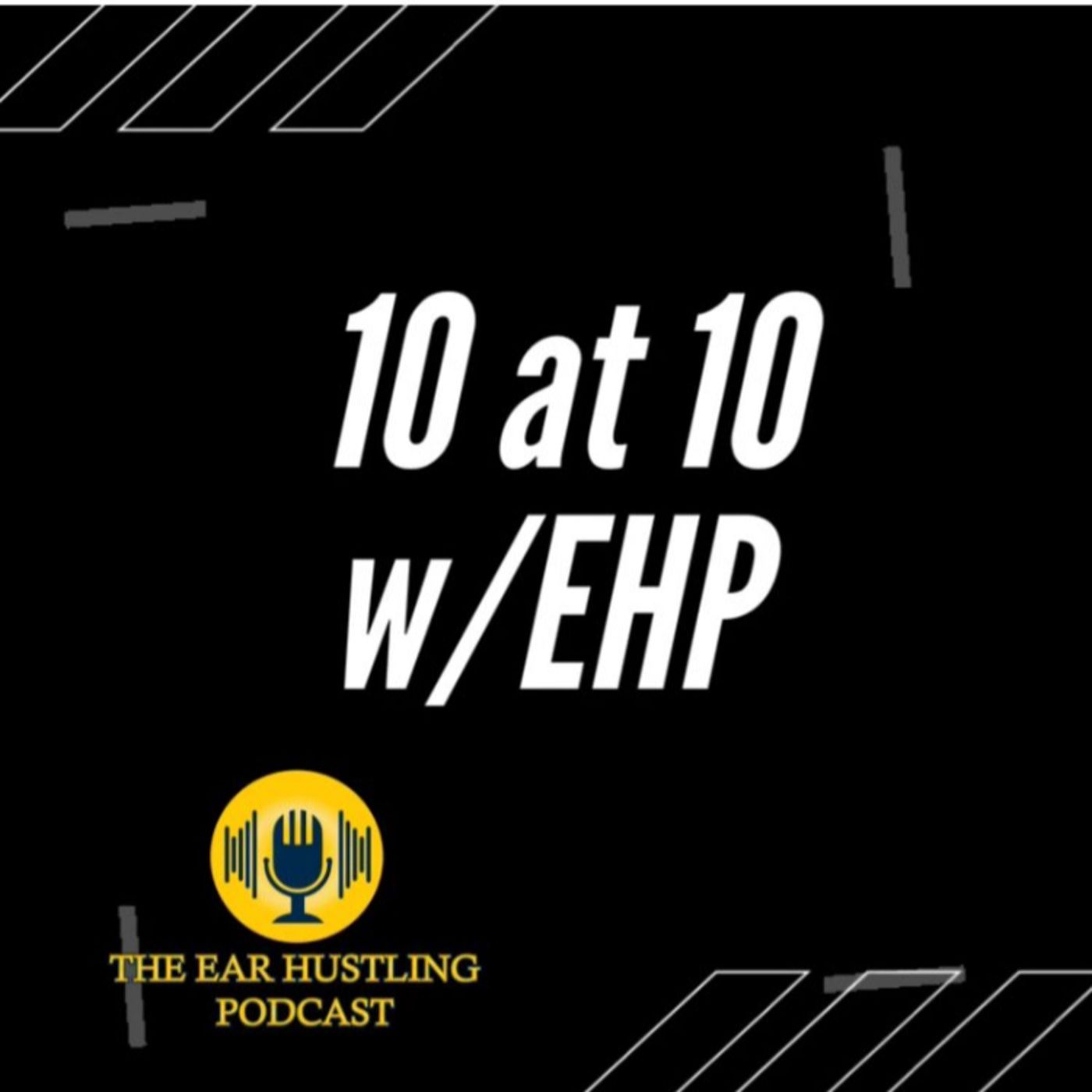Shows
 Toma de DecisionesProductividad Personal y ProfesionalOrganizarte para cumplir todas tus actividades y ser más productivo, requiere tomar decisiones, por eso en este Episodio, queremos ayudarte aumentando tu productividad con unos sencillos pasos que te harán entender que el orden y la priorización son los pilares fundamentales para alcanzar tus objetivos. Acompáñanos en este viaje de conocimiento. #EHP #EscueladeHabilidadesPersonales2022-07-1222 min
Toma de DecisionesProductividad Personal y ProfesionalOrganizarte para cumplir todas tus actividades y ser más productivo, requiere tomar decisiones, por eso en este Episodio, queremos ayudarte aumentando tu productividad con unos sencillos pasos que te harán entender que el orden y la priorización son los pilares fundamentales para alcanzar tus objetivos. Acompáñanos en este viaje de conocimiento. #EHP #EscueladeHabilidadesPersonales2022-07-1222 min MS News & PerspectivesEmerald Health Preparing for Phase 2 Trial of EHP-101 for Relapsing MS & Lemtrada JourneyMultiple Sclerosis News Today’s columnist, Jenn Powell, discusses how Emerald Health is preparing for phase 2 trial of EHP-101 for relapsing forms of MS.
Multiple Sclerosis News Today’s multimedia associate, Price Wooldridge, reads “An Update on My Lemtrada Journey 3 Years After Round 2”, a column by Ed Tobias.
=====================================
Treatment for Relapsing MS Progression | MAYZENT® (siponimod)
Read about MAYZENT, a once daily pill that can significantly slow down disability progression in people with relapsing MS. See full prescribing & safety info.
https://www.mayzent.com/?utm_source=changeinrms&utm_medium=vanityurl&utm_campaign=novartis_mayzent_2020&utm_content=soundcloud
=====================================
Are you interested in learni...2021-04-1609 min
MS News & PerspectivesEmerald Health Preparing for Phase 2 Trial of EHP-101 for Relapsing MS & Lemtrada JourneyMultiple Sclerosis News Today’s columnist, Jenn Powell, discusses how Emerald Health is preparing for phase 2 trial of EHP-101 for relapsing forms of MS.
Multiple Sclerosis News Today’s multimedia associate, Price Wooldridge, reads “An Update on My Lemtrada Journey 3 Years After Round 2”, a column by Ed Tobias.
=====================================
Treatment for Relapsing MS Progression | MAYZENT® (siponimod)
Read about MAYZENT, a once daily pill that can significantly slow down disability progression in people with relapsing MS. See full prescribing & safety info.
https://www.mayzent.com/?utm_source=changeinrms&utm_medium=vanityurl&utm_campaign=novartis_mayzent_2020&utm_content=soundcloud
=====================================
Are you interested in learni...2021-04-1609 min What's Feked Ehp PodcastVolume 12 - NOW THAT'S FEKED EHP!BEN IS BACK!!! The boys begin a new segment/competition bracket style called "Now That's Feked Ehp". Also discussed is the importance of creating an ordered list with the 20 Best Nintendo Online Games. This week's band features Descensum with their song "Apparitions in the Misthttps://youtu.be/6LjmocTf0UI2021-04-141h 25
What's Feked Ehp PodcastVolume 12 - NOW THAT'S FEKED EHP!BEN IS BACK!!! The boys begin a new segment/competition bracket style called "Now That's Feked Ehp". Also discussed is the importance of creating an ordered list with the 20 Best Nintendo Online Games. This week's band features Descensum with their song "Apparitions in the Misthttps://youtu.be/6LjmocTf0UI2021-04-141h 25 Architect RecordingsEHP - RetrofuturismWe welcome EHP to Architect Recordings with his first release on the label.
SPOTIFY - https://open.spotify.com/album/7Gj8XNbTZ9zechPSP7FZUu
BEATPORT - https://www.beatport.com/release/retrofuturism/3020145
APPLE MUSIC - https://music.apple.com/us/album/retrofuturism-single/1519253336?uo=4
ITUNES - https://music.apple.com/us/album/retrofuturism-single/1519253336?uo=4
DEEZER - http://www.deezer.com/album/155552042
Architect on AudioMack - https://audiomack.com/artist/architect-recordings
Architect on Facebook - https://www.facebook.com/architectlabel
Architect on Twitter - https://twitter.com/architecttechno
Architect on Instagram - https://www.instagram.com/architectrecordings
Architect on Label Base...2020-07-0302 min
Architect RecordingsEHP - RetrofuturismWe welcome EHP to Architect Recordings with his first release on the label.
SPOTIFY - https://open.spotify.com/album/7Gj8XNbTZ9zechPSP7FZUu
BEATPORT - https://www.beatport.com/release/retrofuturism/3020145
APPLE MUSIC - https://music.apple.com/us/album/retrofuturism-single/1519253336?uo=4
ITUNES - https://music.apple.com/us/album/retrofuturism-single/1519253336?uo=4
DEEZER - http://www.deezer.com/album/155552042
Architect on AudioMack - https://audiomack.com/artist/architect-recordings
Architect on Facebook - https://www.facebook.com/architectlabel
Architect on Twitter - https://twitter.com/architecttechno
Architect on Instagram - https://www.instagram.com/architectrecordings
Architect on Label Base...2020-07-0302 min The Ear Hustling Podcast with James and Eric10 at 10 with EHP - Mike Pence Ep. 1Ep. 1 of 10 at 10 with EHP is a short version of our normal Monday show. We discuss different topics within 10 minutes (ish) at 10pm EST on Thursday nights every week.This week, we discuss how Jesus tripped the VP!#JesusTakeTheWheel #Podcast #Podcaster #IveFallenAndICantGetUp #Pence #DownGoesTheVP #PenceTakesAKnee--- This episode is sponsored by · Anchor: The easiest way to make a podcast. https://anchor.fm/appSupport this podcast: https://anchor.fm/ear-hustling/support2020-06-2611 min
The Ear Hustling Podcast with James and Eric10 at 10 with EHP - Mike Pence Ep. 1Ep. 1 of 10 at 10 with EHP is a short version of our normal Monday show. We discuss different topics within 10 minutes (ish) at 10pm EST on Thursday nights every week.This week, we discuss how Jesus tripped the VP!#JesusTakeTheWheel #Podcast #Podcaster #IveFallenAndICantGetUp #Pence #DownGoesTheVP #PenceTakesAKnee--- This episode is sponsored by · Anchor: The easiest way to make a podcast. https://anchor.fm/appSupport this podcast: https://anchor.fm/ear-hustling/support2020-06-2611 min The Ear Hustling Podcast10 at 10 with EHP - Mike Pence Ep. 1Ep. 1 of 10 at 10 with EHP is a short version of our normal Monday show. We discuss different topics within 10 minutes (ish) at 10pm EST on Thursday nights every week.
This week, we discuss how Jesus tripped the VP!
#JesusTakeTheWheel #Podcast #Podcaster #IveFallenAndICantGetUp #Pence #DownGoesTheVP #PenceTakesAKnee2020-06-2610 min
The Ear Hustling Podcast10 at 10 with EHP - Mike Pence Ep. 1Ep. 1 of 10 at 10 with EHP is a short version of our normal Monday show. We discuss different topics within 10 minutes (ish) at 10pm EST on Thursday nights every week.
This week, we discuss how Jesus tripped the VP!
#JesusTakeTheWheel #Podcast #Podcaster #IveFallenAndICantGetUp #Pence #DownGoesTheVP #PenceTakesAKnee2020-06-2610 min EHP: The Researcher's PerspectiveThe Art of the Algorithm: Machine Learning in Environmental Health Research, with Nicole KleinstreuerWe live in a time when investigators have overwhelming amounts of health-related data at their fingertips. In this podcast, Nicole Kleinstreuer explains how environmental health scientists are using machine learning to make sense of the information in those data—for example, predicting toxicological end points based on large curated data sets. But even as machine learning advances, researchers are working to set realistic expectations and performance thresholds for these new methods. Visit the podcast webpage to download the full transcript of this podcast. 2020-02-1313 min
EHP: The Researcher's PerspectiveThe Art of the Algorithm: Machine Learning in Environmental Health Research, with Nicole KleinstreuerWe live in a time when investigators have overwhelming amounts of health-related data at their fingertips. In this podcast, Nicole Kleinstreuer explains how environmental health scientists are using machine learning to make sense of the information in those data—for example, predicting toxicological end points based on large curated data sets. But even as machine learning advances, researchers are working to set realistic expectations and performance thresholds for these new methods. Visit the podcast webpage to download the full transcript of this podcast. 2020-02-1313 min The Researcher's PerspectiveThe Art of the Algorithm: Machine Learning in Environmental Health Research, with Nicole KleinstreuerWe live in a time when investigators have overwhelming amounts of health-related data at their fingertips. In this podcast, Nicole Kleinstreuer explains how environmental health scientists are using...
In this original podcast series, researchers from across the environmental health sciences offer insights into the motivation and vision driving their work. They also explore the implications of their findings for human health.2020-02-1313 min
The Researcher's PerspectiveThe Art of the Algorithm: Machine Learning in Environmental Health Research, with Nicole KleinstreuerWe live in a time when investigators have overwhelming amounts of health-related data at their fingertips. In this podcast, Nicole Kleinstreuer explains how environmental health scientists are using...
In this original podcast series, researchers from across the environmental health sciences offer insights into the motivation and vision driving their work. They also explore the implications of their findings for human health.2020-02-1313 min EHP: The Researcher's PerspectiveThe Global Burden of Mercury Exposure, with Niladri BasuMethylmercury, the most toxic form of mercury, is found in seafood around the world, and it can cause severe health effects in people who are exposed to it. Governments are working to reduce the amount of mercury that finds its way into the environment. Dozens of countries have pledged to implement measures to reduce mercury pollution. In this podcast, Niladri Basu discusses his recent systematic review, which estimates global baseline mercury exposures. These estimates will help countries gauge the success of their control measures. Visit the podcast webpage to download the full transcript of this podcast.2019-11-1211 min
EHP: The Researcher's PerspectiveThe Global Burden of Mercury Exposure, with Niladri BasuMethylmercury, the most toxic form of mercury, is found in seafood around the world, and it can cause severe health effects in people who are exposed to it. Governments are working to reduce the amount of mercury that finds its way into the environment. Dozens of countries have pledged to implement measures to reduce mercury pollution. In this podcast, Niladri Basu discusses his recent systematic review, which estimates global baseline mercury exposures. These estimates will help countries gauge the success of their control measures. Visit the podcast webpage to download the full transcript of this podcast.2019-11-1211 min The Researcher's PerspectiveThe Global Burden of Mercury Exposure, with Niladri BasuMethylmercury, the most toxic form of mercury, is found in seafood around the world, and it can cause severe health effects in people who are exposed to it. Governments are working to reduce the...
In this original podcast series, researchers from across the environmental health sciences offer insights into the motivation and vision driving their work. They also explore the implications of their findings for human health.2019-11-1211 min
The Researcher's PerspectiveThe Global Burden of Mercury Exposure, with Niladri BasuMethylmercury, the most toxic form of mercury, is found in seafood around the world, and it can cause severe health effects in people who are exposed to it. Governments are working to reduce the...
In this original podcast series, researchers from across the environmental health sciences offer insights into the motivation and vision driving their work. They also explore the implications of their findings for human health.2019-11-1211 min EHP: The Researcher's PerspectiveGreen and Serene? Exploring the Relationship between Vegetation and Mental Health, with Rachel BanayCan living in green surroundings make you healthier and happier? It’s a tantalizing idea. In this podcast, guest Rachel Banay discusses her recent EHP study on depression in older women in relation to the amount of greenness near their homes. The study is part of a growing body of research that suggests there may, in fact, be health benefits associated with spending time in or near green spaces—although it is too soon to draw any firm conclusions about the nature and direction of the relationship, if it exists. Visit the podcast webpage to download the full transcript of thi...2019-10-0111 min
EHP: The Researcher's PerspectiveGreen and Serene? Exploring the Relationship between Vegetation and Mental Health, with Rachel BanayCan living in green surroundings make you healthier and happier? It’s a tantalizing idea. In this podcast, guest Rachel Banay discusses her recent EHP study on depression in older women in relation to the amount of greenness near their homes. The study is part of a growing body of research that suggests there may, in fact, be health benefits associated with spending time in or near green spaces—although it is too soon to draw any firm conclusions about the nature and direction of the relationship, if it exists. Visit the podcast webpage to download the full transcript of thi...2019-10-0111 min The Researcher's PerspectiveGreen and Serene? Exploring the Relationship between Vegetation and Mental Health, with Rachel BanayCan living in green surroundings make you healthier and happier? It’s a tantalizing idea. In this podcast, guest Rachel Banay discusses her recent EHP study on depression in older women in relation...
In this original podcast series, researchers from across the environmental health sciences offer insights into the motivation and vision driving their work. They also explore the implications of their findings for human health.2019-10-0111 min
The Researcher's PerspectiveGreen and Serene? Exploring the Relationship between Vegetation and Mental Health, with Rachel BanayCan living in green surroundings make you healthier and happier? It’s a tantalizing idea. In this podcast, guest Rachel Banay discusses her recent EHP study on depression in older women in relation...
In this original podcast series, researchers from across the environmental health sciences offer insights into the motivation and vision driving their work. They also explore the implications of their findings for human health.2019-10-0111 min The Researcher's PerspectiveKey Characteristics: A New Approach to Identifying Potential Toxicants, with Martyn SmithIt would be nearly impossible using current methods to test all the chemicals in use for toxic effects. So how do we prioritize which ones to study? In this podcast, Martyn Smith describes how he and...
In this original podcast series, researchers from across the environmental health sciences offer insights into the motivation and vision driving their work. They also explore the implications of their findings for human health.2019-07-2214 min
The Researcher's PerspectiveKey Characteristics: A New Approach to Identifying Potential Toxicants, with Martyn SmithIt would be nearly impossible using current methods to test all the chemicals in use for toxic effects. So how do we prioritize which ones to study? In this podcast, Martyn Smith describes how he and...
In this original podcast series, researchers from across the environmental health sciences offer insights into the motivation and vision driving their work. They also explore the implications of their findings for human health.2019-07-2214 min EHP: The Researcher's PerspectiveKey Characteristics: A New Approach to Identifying Potential Toxicants, with Martyn SmithIt would be nearly impossible using current methods to test all the chemicals in use for toxic effects. So how do we prioritize which ones to study? In this podcast, Martyn Smith describes how he and his colleagues are developing lists of “key characteristics” shared by toxicants that cause specific adverse health effects, such as cancer or male or female reproductive toxicity. Risk assessors can use this information to predict the toxicity of other chemicals in an organized, systematic way. This approach may be useful in prioritizing chemicals for more detailed evaluation. Visit the podcast webpage to download the full...2019-07-2214 min
EHP: The Researcher's PerspectiveKey Characteristics: A New Approach to Identifying Potential Toxicants, with Martyn SmithIt would be nearly impossible using current methods to test all the chemicals in use for toxic effects. So how do we prioritize which ones to study? In this podcast, Martyn Smith describes how he and his colleagues are developing lists of “key characteristics” shared by toxicants that cause specific adverse health effects, such as cancer or male or female reproductive toxicity. Risk assessors can use this information to predict the toxicity of other chemicals in an organized, systematic way. This approach may be useful in prioritizing chemicals for more detailed evaluation. Visit the podcast webpage to download the full...2019-07-2214 min The Researcher's PerspectiveWind Turbines and Health: The Noise Connection, with Aslak Harbo PoulsenFor some people, the whoosh of wind turbines is the sound of clean energy. For others, it is the sound of an environmental exposure that could possibly cause adverse health effects. Wind turbine...
In this original podcast series, researchers from across the environmental health sciences offer insights into the motivation and vision driving their work. They also explore the implications of their findings for human health.2019-05-2010 min
The Researcher's PerspectiveWind Turbines and Health: The Noise Connection, with Aslak Harbo PoulsenFor some people, the whoosh of wind turbines is the sound of clean energy. For others, it is the sound of an environmental exposure that could possibly cause adverse health effects. Wind turbine...
In this original podcast series, researchers from across the environmental health sciences offer insights into the motivation and vision driving their work. They also explore the implications of their findings for human health.2019-05-2010 min EHP: The Researcher's PerspectiveWind Turbines and Health: The Noise Connection, with Aslak Harbo PoulsenFor some people, the whoosh of wind turbines is the sound of clean energy. For others, it is the sound of an environmental exposure that could possibly cause adverse health effects. Wind turbine noise has been studied in relation to diabetes, hypertension, preterm birth, and more. In this podcast, Aslak Harbo Poulsen discusses his research on wind turbine noise in relation to two more outcomes: likelihood of filling prescriptions for sleeping pills or antidepressants, and risk of heart attack or stroke. Visit the podcast webpage to download a full transcript of this podcast. 2019-05-2010 min
EHP: The Researcher's PerspectiveWind Turbines and Health: The Noise Connection, with Aslak Harbo PoulsenFor some people, the whoosh of wind turbines is the sound of clean energy. For others, it is the sound of an environmental exposure that could possibly cause adverse health effects. Wind turbine noise has been studied in relation to diabetes, hypertension, preterm birth, and more. In this podcast, Aslak Harbo Poulsen discusses his research on wind turbine noise in relation to two more outcomes: likelihood of filling prescriptions for sleeping pills or antidepressants, and risk of heart attack or stroke. Visit the podcast webpage to download a full transcript of this podcast. 2019-05-2010 min EHP: The Researcher's PerspectiveA Regrettable Substitute: The Story of GenX, with Jane HoppinDuPont introduced GenX almost 10 years ago as a chemical substitute for perfluorooctanoic acid (PFOA). Although GenX was intended to be less environmentally persistent than PFOA, it has turned out to be what is known as a “regrettable substitute,” whose effects may be as bad as or even worse than the chemical it replaced. In this podcast, guest Jane Hoppin discusses her work assessing exposures to GenX and related chemicals in people living in the Lower Cape Fear River Basin of North Carolina. Visit the podcast webpage to download the full transcript of this podcast.2019-03-1415 min
EHP: The Researcher's PerspectiveA Regrettable Substitute: The Story of GenX, with Jane HoppinDuPont introduced GenX almost 10 years ago as a chemical substitute for perfluorooctanoic acid (PFOA). Although GenX was intended to be less environmentally persistent than PFOA, it has turned out to be what is known as a “regrettable substitute,” whose effects may be as bad as or even worse than the chemical it replaced. In this podcast, guest Jane Hoppin discusses her work assessing exposures to GenX and related chemicals in people living in the Lower Cape Fear River Basin of North Carolina. Visit the podcast webpage to download the full transcript of this podcast.2019-03-1415 min The Researcher's PerspectiveA Regrettable Substitute: The Story of GenX, with Jane HoppinDuPont introduced GenX almost 10 years ago as a chemical substitute for perfluorooctanoic acid (PFOA). Although GenX was intended to be less environmentally persistent than PFOA, it has turned out to...
In this original podcast series, researchers from across the environmental health sciences offer insights into the motivation and vision driving their work. They also explore the implications of their findings for human health.2019-03-1415 min
The Researcher's PerspectiveA Regrettable Substitute: The Story of GenX, with Jane HoppinDuPont introduced GenX almost 10 years ago as a chemical substitute for perfluorooctanoic acid (PFOA). Although GenX was intended to be less environmentally persistent than PFOA, it has turned out to...
In this original podcast series, researchers from across the environmental health sciences offer insights into the motivation and vision driving their work. They also explore the implications of their findings for human health.2019-03-1415 min EHP: The Researcher's PerspectiveArsenic and Obesity: A Compound Risk Factor for Diabetes? with Mirek StýbloAlthough obesity is a major risk factor for diabetes, certain environmental agents, such as arsenic, also appear to contribute to the disease. There is evidence that an individual’s risk of arsenic-related disease depends on how efficiently he or she metabolizes arsenic. But what if that individual is both obese and exposed to arsenic? In this podcast, guest Mirek Stýblo discusses his recent work exploring the role that diet plays not just in arsenic metabolism but also in the diabetogenic effects of arsenic. Visit the podcast webpage to download the full transcript of this podcast.2019-01-2811 min
EHP: The Researcher's PerspectiveArsenic and Obesity: A Compound Risk Factor for Diabetes? with Mirek StýbloAlthough obesity is a major risk factor for diabetes, certain environmental agents, such as arsenic, also appear to contribute to the disease. There is evidence that an individual’s risk of arsenic-related disease depends on how efficiently he or she metabolizes arsenic. But what if that individual is both obese and exposed to arsenic? In this podcast, guest Mirek Stýblo discusses his recent work exploring the role that diet plays not just in arsenic metabolism but also in the diabetogenic effects of arsenic. Visit the podcast webpage to download the full transcript of this podcast.2019-01-2811 min The Researcher's PerspectiveArsenic and Obesity: A Compound Risk Factor for Diabetes? with Mirek StýbloAlthough obesity is a major risk factor for diabetes, certain environmental agents, such as arsenic, also appear to contribute to the disease. There is evidence that an individual’s risk of...
In this original podcast series, researchers from across the environmental health sciences offer insights into the motivation and vision driving their work. They also explore the implications of their findings for human health.2019-01-2811 min
The Researcher's PerspectiveArsenic and Obesity: A Compound Risk Factor for Diabetes? with Mirek StýbloAlthough obesity is a major risk factor for diabetes, certain environmental agents, such as arsenic, also appear to contribute to the disease. There is evidence that an individual’s risk of...
In this original podcast series, researchers from across the environmental health sciences offer insights into the motivation and vision driving their work. They also explore the implications of their findings for human health.2019-01-2811 min Getting On Top"The Sunny Side of Your Mind" with Paul Morris, EHP"THE SUNNY SIDE OF YOUR MIND:" FIVE STEPS TOWARDS IMPROVING YOUR MOOD with PAUL MORRIS, EHP
The realization that I have finally come to after living more decades than I enjoy admitting to is that “mood conquers all.” I used to think, believe and accept that a bad or dark mood was the direct result of my circumstances and until and unless this was changed, I had no choice but to suffer the consequence of my current life situation. This lead me, in my younger days, to seeking out venues where I could drink and party to boost my mood or thin...2016-05-1700 min
Getting On Top"The Sunny Side of Your Mind" with Paul Morris, EHP"THE SUNNY SIDE OF YOUR MIND:" FIVE STEPS TOWARDS IMPROVING YOUR MOOD with PAUL MORRIS, EHP
The realization that I have finally come to after living more decades than I enjoy admitting to is that “mood conquers all.” I used to think, believe and accept that a bad or dark mood was the direct result of my circumstances and until and unless this was changed, I had no choice but to suffer the consequence of my current life situation. This lead me, in my younger days, to seeking out venues where I could drink and party to boost my mood or thin...2016-05-1700 min Getting On TopUnderstanding and Controlling Depression with Paul Morris, EHPUNDERSTANDING and CONTROLLING DEPRESSION with PAUL MORRIS, EHP
Paul Morris is an Emotional Healing Practitioner, Life Coach, Author, Corporate Training Consultant and Talk Show host. Paul holds a B.S. in Math and Engineering science. His background encompasses the fields of Computer Science, IT Sales, Corporate Training and Emotional Healing, founding and running his own Corporate Training consulting company in 1990. Paul has studied extensively in the fields of psychology, human development, behavior and human potential and is the developer of the Emotional Control Method™ or ECM™ and the Three Step Method for Conquering Depression For Life™.
Please tune in to find out...2016-03-0100 min
Getting On TopUnderstanding and Controlling Depression with Paul Morris, EHPUNDERSTANDING and CONTROLLING DEPRESSION with PAUL MORRIS, EHP
Paul Morris is an Emotional Healing Practitioner, Life Coach, Author, Corporate Training Consultant and Talk Show host. Paul holds a B.S. in Math and Engineering science. His background encompasses the fields of Computer Science, IT Sales, Corporate Training and Emotional Healing, founding and running his own Corporate Training consulting company in 1990. Paul has studied extensively in the fields of psychology, human development, behavior and human potential and is the developer of the Emotional Control Method™ or ECM™ and the Three Step Method for Conquering Depression For Life™.
Please tune in to find out...2016-03-0100 min Getting On TopThe Five Cornerstones of Our Life in the Universe with Paul Morris, BS, EHPTHE FIVE CORNERSTONES OF OUR LIFE IN THE UNIVERSE with PAUL MORRIS, BS, EHP
Five basic cornerstones of life are: Love (Light), Time & Space, Duality, Free Will (Intention) and Flow (Transcendence). Why and how do these aspects of the universe and our lives on earth form the foundation and underpinning of our existence? Why do these five basic concepts and drivers run the show for us mortals in this seemingly unpredictable world of ours? Tune in to find out.
Paul Morris is an Emotional Healing Practitioner, Life Coach, Author, Corporate Training Consultant and Talk Show host. Paul holds a B.S. i...2016-01-0500 min
Getting On TopThe Five Cornerstones of Our Life in the Universe with Paul Morris, BS, EHPTHE FIVE CORNERSTONES OF OUR LIFE IN THE UNIVERSE with PAUL MORRIS, BS, EHP
Five basic cornerstones of life are: Love (Light), Time & Space, Duality, Free Will (Intention) and Flow (Transcendence). Why and how do these aspects of the universe and our lives on earth form the foundation and underpinning of our existence? Why do these five basic concepts and drivers run the show for us mortals in this seemingly unpredictable world of ours? Tune in to find out.
Paul Morris is an Emotional Healing Practitioner, Life Coach, Author, Corporate Training Consultant and Talk Show host. Paul holds a B.S. i...2016-01-0500 min Getting On TopDoes Life Have Intrinsic Meaning? with Paul Morris, EHPDOES LIFE HAVE INTRINSIC MEANING? with PAUL MORRIS, EHP
Is life meaningful all on its own? Does just being born and dying have inherent value or is there more to it than that? Why do people follow religion, take up causes, create things that may be considered art or not and search for meaning in life? If life already has meaning then why do we have to search for it?
You are invited to call in to search for answers to this most pivotal of questions to our often perplexing existence.
Please check Paul Morris out at depressivesanonymous.org2015-12-1500 min
Getting On TopDoes Life Have Intrinsic Meaning? with Paul Morris, EHPDOES LIFE HAVE INTRINSIC MEANING? with PAUL MORRIS, EHP
Is life meaningful all on its own? Does just being born and dying have inherent value or is there more to it than that? Why do people follow religion, take up causes, create things that may be considered art or not and search for meaning in life? If life already has meaning then why do we have to search for it?
You are invited to call in to search for answers to this most pivotal of questions to our often perplexing existence.
Please check Paul Morris out at depressivesanonymous.org2015-12-1500 min Getting On TopIt’s About Time with Paul Morris, EHPIT’S ABOUT TIME with PAUL MORRIS, EHP
Is time our friend or does it work against us? The most important aspect in most negotiations is time, hopefully it is on our side. Times Arrow" moves only in one direction: forward. Why does time exist in the universe? And where does it not exist?
Albert Einstein said: "Time is what prevents everything from happening at once." Einstein of course was right. But what does that mean exactly? And why is losing tract of time so important in our lives. Tune in to find out.2015-11-2400 min
Getting On TopIt’s About Time with Paul Morris, EHPIT’S ABOUT TIME with PAUL MORRIS, EHP
Is time our friend or does it work against us? The most important aspect in most negotiations is time, hopefully it is on our side. Times Arrow" moves only in one direction: forward. Why does time exist in the universe? And where does it not exist?
Albert Einstein said: "Time is what prevents everything from happening at once." Einstein of course was right. But what does that mean exactly? And why is losing tract of time so important in our lives. Tune in to find out.2015-11-2400 min Getting On TopWhat Is Emotional Trauma & How Does It Affect Our Lives? with Paul Morris, EHPWHAT IS EMOTIONAL TRAUMA & HOW DOES IT AFFECT OUR LIVES? with PAUL MORRIS, EHP
The Emotional Trauma we endure, usually in childhood, is a crucial factor for setting the course of our lives.
On this show Paul will discuss the nature and meaning of Emotional Trauma. This, all too common occurrence in the lives of just about everyone, leaves an indelible mark on us and more often than not is a major factor in determining how successful we are in negotiating through our life’s journey.
Paul Morris, is an Emotional Healing Practitioner and the developer of the Emotional Control Met...2015-10-1300 min
Getting On TopWhat Is Emotional Trauma & How Does It Affect Our Lives? with Paul Morris, EHPWHAT IS EMOTIONAL TRAUMA & HOW DOES IT AFFECT OUR LIVES? with PAUL MORRIS, EHP
The Emotional Trauma we endure, usually in childhood, is a crucial factor for setting the course of our lives.
On this show Paul will discuss the nature and meaning of Emotional Trauma. This, all too common occurrence in the lives of just about everyone, leaves an indelible mark on us and more often than not is a major factor in determining how successful we are in negotiating through our life’s journey.
Paul Morris, is an Emotional Healing Practitioner and the developer of the Emotional Control Met...2015-10-1300 min Getting On TopWhy Are We Here? with Paul Morris, EHPWHY ARE WE HERE? with PAUL MORRIS, EHP
On this show I, your host will discuss the esoteric side of life, namely what is truly important about our existence and which aspects are merely diversions to distract us from what is really going on. Why does life require distractions and what is it really about? How do we know that the things that seem to be so important in our lives turn out not to be so crucial after all? And how do we know what is essential to our time on Earth?
Find out more about Paul at www.dep...2015-09-1600 min
Getting On TopWhy Are We Here? with Paul Morris, EHPWHY ARE WE HERE? with PAUL MORRIS, EHP
On this show I, your host will discuss the esoteric side of life, namely what is truly important about our existence and which aspects are merely diversions to distract us from what is really going on. Why does life require distractions and what is it really about? How do we know that the things that seem to be so important in our lives turn out not to be so crucial after all? And how do we know what is essential to our time on Earth?
Find out more about Paul at www.dep...2015-09-1600 min Getting On TopDepression: Everything You Should Know But Never Asked w/ Paul Morris, EHPDEPRESSION: EVERYTHING YOU SHOULD KNOW BUT NEVER ASKED with PAUL MORRIS, EHP
On this show I, your host and friendly Emotional Healing Practitioner, will answer some of the questions that often arise in relation to Depression, including:
• What Is True Depression?
• Why You Can’t Outwit Depression
• Why Depression is NOT Hereditary
• What is Depression’s On & Off Switch
• Why so many suffers have Refractory Depression (Do not respond to traditional methods of treatment)
• Why the Nature of Depression Alludes the Medical Community
• The True Link Between Suicide and Depression
Find out more at www.depressivesanonymous.org
2015-08-2600 min
Getting On TopDepression: Everything You Should Know But Never Asked w/ Paul Morris, EHPDEPRESSION: EVERYTHING YOU SHOULD KNOW BUT NEVER ASKED with PAUL MORRIS, EHP
On this show I, your host and friendly Emotional Healing Practitioner, will answer some of the questions that often arise in relation to Depression, including:
• What Is True Depression?
• Why You Can’t Outwit Depression
• Why Depression is NOT Hereditary
• What is Depression’s On & Off Switch
• Why so many suffers have Refractory Depression (Do not respond to traditional methods of treatment)
• Why the Nature of Depression Alludes the Medical Community
• The True Link Between Suicide and Depression
Find out more at www.depressivesanonymous.org
2015-08-2600 min Getting On TopWhat Depression Is & What it is Not with Paul Morris, EHPWHAT DEPRESSION IS & WHAT IT IS NOT with PAUL MORRIS, EHP
Paul Morris is an Emotional Healing Practitioner, Life Coach, Author, Sales Trainer and Talk show radio host. Paul is the developer of The Emotional Control Method™ and The Morris Method™, the natural way for Conquering Depression for Life™.
Paul conducts his practice from his office in Rockland County, New York and is also available by phone.
On this show I, your host will discuss the true nature of Depression while answering the main questions including what causes depression, why it is so difficult to understand its true nature, why it is...2015-08-0600 min
Getting On TopWhat Depression Is & What it is Not with Paul Morris, EHPWHAT DEPRESSION IS & WHAT IT IS NOT with PAUL MORRIS, EHP
Paul Morris is an Emotional Healing Practitioner, Life Coach, Author, Sales Trainer and Talk show radio host. Paul is the developer of The Emotional Control Method™ and The Morris Method™, the natural way for Conquering Depression for Life™.
Paul conducts his practice from his office in Rockland County, New York and is also available by phone.
On this show I, your host will discuss the true nature of Depression while answering the main questions including what causes depression, why it is so difficult to understand its true nature, why it is...2015-08-0600 min Getting On TopUnderstanding & Overcoming Depression with Paul Morris, EHPUNDERSTANDING & OVERCOMING DEPRESSION with PAUL MORRIS, EHP
On this show I, your host will give the listeners a preview of the presentation I will be delivering at the Awaken Fair, this Saturday, April 25th at 1:15pm at the Sheraton Stamford Hotel in Stamford CT. Find it @ www.awakenfair.com/stamford-4-25-15.html
On the show I will cover:
• What is depression?
• How do we get depression?
• How does it affect our lives?
• Why is there such a strong correlation between depression and suicide.
• How do we conquer it and eliminate it from our lives.
Depression tortured and killed my father and tormented me for many years as well, until I became an Emotional Hea...2015-04-2200 min
Getting On TopUnderstanding & Overcoming Depression with Paul Morris, EHPUNDERSTANDING & OVERCOMING DEPRESSION with PAUL MORRIS, EHP
On this show I, your host will give the listeners a preview of the presentation I will be delivering at the Awaken Fair, this Saturday, April 25th at 1:15pm at the Sheraton Stamford Hotel in Stamford CT. Find it @ www.awakenfair.com/stamford-4-25-15.html
On the show I will cover:
• What is depression?
• How do we get depression?
• How does it affect our lives?
• Why is there such a strong correlation between depression and suicide.
• How do we conquer it and eliminate it from our lives.
Depression tortured and killed my father and tormented me for many years as well, until I became an Emotional Hea...2015-04-2200 min Getting On TopDepression: More Than Just A Mood Disorder with Paul Morris, EHPDEPRESSION: MORE THAN JUST A MOOD DISORDER with PAUL MORRIS, EHP
On this show I, your host will discuss why both the medical and psychotherapeutic communities do not completely understand what Depression actually is. The mood disorder that Depression creates is a symptom of this grim, relentless affliction, but it not the cause, which I will discuss in detail on the show. I will also examine the clear and absolute connection between depression and suicide.2015-02-2500 min
Getting On TopDepression: More Than Just A Mood Disorder with Paul Morris, EHPDEPRESSION: MORE THAN JUST A MOOD DISORDER with PAUL MORRIS, EHP
On this show I, your host will discuss why both the medical and psychotherapeutic communities do not completely understand what Depression actually is. The mood disorder that Depression creates is a symptom of this grim, relentless affliction, but it not the cause, which I will discuss in detail on the show. I will also examine the clear and absolute connection between depression and suicide.2015-02-2500 min Getting On TopUnderstanding Depression with Paul Morris, EHPUNDERSTANDING DEPRESSIONwith PAUL MORRIS, EHP
On this show I, your host, will be discussing what I believe is the primary cause of Depression, its symptoms and approaches to dealing with its effects. Depression killed my father and caused him great suffering throughout his life. I too suffered from this hideous and insidious affliction but fortunately, not as badly as he. Thankfully, I am now effectively symptom free and have helped others attain a similar place of peace and calm.2014-05-2100 min
Getting On TopUnderstanding Depression with Paul Morris, EHPUNDERSTANDING DEPRESSIONwith PAUL MORRIS, EHP
On this show I, your host, will be discussing what I believe is the primary cause of Depression, its symptoms and approaches to dealing with its effects. Depression killed my father and caused him great suffering throughout his life. I too suffered from this hideous and insidious affliction but fortunately, not as badly as he. Thankfully, I am now effectively symptom free and have helped others attain a similar place of peace and calm.2014-05-2100 min EHP: The Researcher's PerspectivePhthalates and Childhood Asthma, with Randi BertelsenSeveral studies have reported links between asthma in children and the presence of phthalates in dust from the children’s homes. But the presence of a chemical is not the same thing as exposure, so Norway’s Environment and Childhood Asthma Study has taken the research a step farther by measuring phthalates in the urine of children with and without asthma. In this podcast Randi Bertelsen discusses her recently published findings. Visit the podcast webpage to download the full transcript of this podcast.2013-03-0109 min
EHP: The Researcher's PerspectivePhthalates and Childhood Asthma, with Randi BertelsenSeveral studies have reported links between asthma in children and the presence of phthalates in dust from the children’s homes. But the presence of a chemical is not the same thing as exposure, so Norway’s Environment and Childhood Asthma Study has taken the research a step farther by measuring phthalates in the urine of children with and without asthma. In this podcast Randi Bertelsen discusses her recently published findings. Visit the podcast webpage to download the full transcript of this podcast.2013-03-0109 min EHP: The Researcher's PerspectiveAn Unlikely Duo: Air Pollution’s Link to Low Birth Weight, with Tracey WoodruffWhen you think about the health effects of air pollution, what comes to mind? Lung disease? Cancer? One health effect you might not immediately think of is low birth weight, a risk factor for a variety of other health problems later in life. Yet a growing body of evidence indicates that birth weight and other gestational outcomes can be influenced by a mother’s exposure to fine particulate matter air pollution. In this podcast Tracey Woodruff discusses new findings on this link from a global consortium of investigators who, between them, have analyzed more than 3 million births. Visit the po...2013-02-0110 min
EHP: The Researcher's PerspectiveAn Unlikely Duo: Air Pollution’s Link to Low Birth Weight, with Tracey WoodruffWhen you think about the health effects of air pollution, what comes to mind? Lung disease? Cancer? One health effect you might not immediately think of is low birth weight, a risk factor for a variety of other health problems later in life. Yet a growing body of evidence indicates that birth weight and other gestational outcomes can be influenced by a mother’s exposure to fine particulate matter air pollution. In this podcast Tracey Woodruff discusses new findings on this link from a global consortium of investigators who, between them, have analyzed more than 3 million births. Visit the po...2013-02-0110 min EHP: The Researcher's PerspectiveThe Secret Life of Fat, with Michele La MerrillYour bulges are busier than you may think…Many people see adipose tissue—fat—as nothing more than lumpy extra baggage. But fat serves several important functions in the body. It helps us store energy and endocrine hormones that can affect behavior, energy regulation, immune and vascular function—to name a few. It also protects against toxic effects of persistent organic pollutants, or POPs. In this podcast, Michele La Merrill talks with host Ashley Ahearn about the diverse ways that fat interacts with these chemicals as both a modulator and a target of POP toxicity. Visit the podcast webpage to downl...2013-01-0208 min
EHP: The Researcher's PerspectiveThe Secret Life of Fat, with Michele La MerrillYour bulges are busier than you may think…Many people see adipose tissue—fat—as nothing more than lumpy extra baggage. But fat serves several important functions in the body. It helps us store energy and endocrine hormones that can affect behavior, energy regulation, immune and vascular function—to name a few. It also protects against toxic effects of persistent organic pollutants, or POPs. In this podcast, Michele La Merrill talks with host Ashley Ahearn about the diverse ways that fat interacts with these chemicals as both a modulator and a target of POP toxicity. Visit the podcast webpage to downl...2013-01-0208 min EHP: The Researcher's PerspectiveLeaded Aviation Gasoline and Child Blood Lead Levels, with Marie Lynn MirandaDespite dramatic decreases in atmospheric lead levels over the past few decades, lead exposure remains a problem, especially for children. In this podcast, Marie Lynn Miranda discusses one remaining, albeit relatively minor, source of lead exposure: leaded aviation gasoline. Visit the podcast webpage to download the full transcript of this podcast.2012-12-0109 min
EHP: The Researcher's PerspectiveLeaded Aviation Gasoline and Child Blood Lead Levels, with Marie Lynn MirandaDespite dramatic decreases in atmospheric lead levels over the past few decades, lead exposure remains a problem, especially for children. In this podcast, Marie Lynn Miranda discusses one remaining, albeit relatively minor, source of lead exposure: leaded aviation gasoline. Visit the podcast webpage to download the full transcript of this podcast.2012-12-0109 min EHP: The Researcher's PerspectiveExploring Links between Arsenic and Diabetes, with Ana Navas-AcienArsenic is a problem in communities around the world, from Bangladesh to New Hampshire. It’s one of the environmental chemicals the National Toxicology Program explored at a recent workshop as possibly contributing to the worldwide rise in diabetes. In this podcast, Ana Navas-Acien talks about a new review by investigators at that workshop, who summarize the evidence for a link between arsenic exposure and diabetes. Visit the podcast webpage to download the full transcript of this podcast.2012-11-0109 min
EHP: The Researcher's PerspectiveExploring Links between Arsenic and Diabetes, with Ana Navas-AcienArsenic is a problem in communities around the world, from Bangladesh to New Hampshire. It’s one of the environmental chemicals the National Toxicology Program explored at a recent workshop as possibly contributing to the worldwide rise in diabetes. In this podcast, Ana Navas-Acien talks about a new review by investigators at that workshop, who summarize the evidence for a link between arsenic exposure and diabetes. Visit the podcast webpage to download the full transcript of this podcast.2012-11-0109 min EHP: The Researcher's PerspectivePost-Katrina Asthma in the Children of New Orleans, with Patricia ChuladaNew Orleans is already known as a hot, moist place—ideal growing conditions for mold. Now factor in Hurricane Katrina, which hit the city in August of 2005, leaving behind even more indoor mold and other asthma-causing allergens. Host Ashley Ahearn talks with Patricia Chulada about research to study and improve post-Katrina asthma symptoms in the children of New Orleans. Visit the podcast webpage to download the full transcript of this podcast.2012-10-0109 min
EHP: The Researcher's PerspectivePost-Katrina Asthma in the Children of New Orleans, with Patricia ChuladaNew Orleans is already known as a hot, moist place—ideal growing conditions for mold. Now factor in Hurricane Katrina, which hit the city in August of 2005, leaving behind even more indoor mold and other asthma-causing allergens. Host Ashley Ahearn talks with Patricia Chulada about research to study and improve post-Katrina asthma symptoms in the children of New Orleans. Visit the podcast webpage to download the full transcript of this podcast.2012-10-0109 min EHP: The Researcher's PerspectiveEpigenomics and Maternal Smoking, with Bonnie Joubert and Stephanie LondonChildren whose mothers smoked during pregnancy are more likely to have problems like low birth weight, asthma, and possibly obesity, cancer, and high blood pressure. For clues into the mechanism behind these effects, scientists are looking to the epigenome, the personalized set of directions that tells our cells how and when to produce proteins, which is one of the ways gene activity is controlled. In this podcast Stephanie London and Bonnie Joubert discuss the results of their recent study in which they identified a set of genes with methylation changes present at birth in children whose mothers smoked during...2012-09-0107 min
EHP: The Researcher's PerspectiveEpigenomics and Maternal Smoking, with Bonnie Joubert and Stephanie LondonChildren whose mothers smoked during pregnancy are more likely to have problems like low birth weight, asthma, and possibly obesity, cancer, and high blood pressure. For clues into the mechanism behind these effects, scientists are looking to the epigenome, the personalized set of directions that tells our cells how and when to produce proteins, which is one of the ways gene activity is controlled. In this podcast Stephanie London and Bonnie Joubert discuss the results of their recent study in which they identified a set of genes with methylation changes present at birth in children whose mothers smoked during...2012-09-0107 min EHP: The Researcher's PerspectiveClimate Change and Migration, with Celia McMichael and Jon BarnettOver the past million years humans have migrated in response to food shortages, droughts, ice ages, and many other reasons, but in the coming decades, migrations related to climate change are expected to increase, perhaps dramatically. Different circumstances—be it forced displacement, a planned resettlement, or migration into a city—can present different humanitarian and health adversities, but population movements also can offer benefits for migrants themselves, the communities they left, and the communities where they land. In this podcast, Celia McMichael and Jon Barnett tell host Ashley Ahearn about research and policy steps needed in advance of the risi...2012-08-0112 min
EHP: The Researcher's PerspectiveClimate Change and Migration, with Celia McMichael and Jon BarnettOver the past million years humans have migrated in response to food shortages, droughts, ice ages, and many other reasons, but in the coming decades, migrations related to climate change are expected to increase, perhaps dramatically. Different circumstances—be it forced displacement, a planned resettlement, or migration into a city—can present different humanitarian and health adversities, but population movements also can offer benefits for migrants themselves, the communities they left, and the communities where they land. In this podcast, Celia McMichael and Jon Barnett tell host Ashley Ahearn about research and policy steps needed in advance of the risi...2012-08-0112 min EHP: The Researcher's PerspectiveWhat Do We Know about Obesogens? with Bruce BlumbergHuman beings, as a species, are putting on weight. Obesity rates are rising in rich and poor countries alike for a variety of reasons, from changing dietary habits and activity levels to exposure to artificial nighttime light. Mounting evidence from over the past decade suggests that certain chemicals may be playing a role as well. For some people, so-called obesogens may be altering their metabolism and fat cell development, making it harder to maintain a healthy weight. In this podcast, host Ashley Ahearn talks with Bruce Blumberg about the state of our understanding of obesogens. Visit the podcast webpage...2012-07-0208 min
EHP: The Researcher's PerspectiveWhat Do We Know about Obesogens? with Bruce BlumbergHuman beings, as a species, are putting on weight. Obesity rates are rising in rich and poor countries alike for a variety of reasons, from changing dietary habits and activity levels to exposure to artificial nighttime light. Mounting evidence from over the past decade suggests that certain chemicals may be playing a role as well. For some people, so-called obesogens may be altering their metabolism and fat cell development, making it harder to maintain a healthy weight. In this podcast, host Ashley Ahearn talks with Bruce Blumberg about the state of our understanding of obesogens. Visit the podcast webpage...2012-07-0208 min EHP: The Researcher's PerspectiveLow-dose Effects of Endocrine Disruptors, with Laura VandenbergReproduction, growth, behavior, and sleep patterns are just a few of the bodily functions controlled by hormones. Researchers around the world are examining what happens if chemical substances we’re exposed to in our daily lives interrupt or imitate natural hormonal messages. The body of scientific evidence so far suggests that even at very low doses, exposures to endocrine disruptors may have very real effects, and that low-dose effects may disappear at higher doses, giving an illusion of safety if chemicals are not tested at low-enough doses. In this podcast, host Ashley Ahearn talks with Laura Vandenberg about her re...2012-06-0108 min
EHP: The Researcher's PerspectiveLow-dose Effects of Endocrine Disruptors, with Laura VandenbergReproduction, growth, behavior, and sleep patterns are just a few of the bodily functions controlled by hormones. Researchers around the world are examining what happens if chemical substances we’re exposed to in our daily lives interrupt or imitate natural hormonal messages. The body of scientific evidence so far suggests that even at very low doses, exposures to endocrine disruptors may have very real effects, and that low-dose effects may disappear at higher doses, giving an illusion of safety if chemicals are not tested at low-enough doses. In this podcast, host Ashley Ahearn talks with Laura Vandenberg about her re...2012-06-0108 min EHP: The Researcher's PerspectiveBite of Arsenic, with Kathryn CottinghamMany organic foods and high-energy products are sweetened with brown rice syrup as an alternative to high-fructose corn syrup. Consumers who eat these products may be avoiding high-fructose corn syrup, but they also may be exposed to arsenic that's been absorbed by the rice plants from which the syrup is made. In this podcast, Kathryn Cottingham talks with host Ashley Ahearn about her recent market-basket study of products containing brown rice syrup and other rice-based ingredients. Arsenic was detected in all the products tested, although Cottingham cautions it's too soon to say what this means in terms of potential...2012-05-0107 min
EHP: The Researcher's PerspectiveBite of Arsenic, with Kathryn CottinghamMany organic foods and high-energy products are sweetened with brown rice syrup as an alternative to high-fructose corn syrup. Consumers who eat these products may be avoiding high-fructose corn syrup, but they also may be exposed to arsenic that's been absorbed by the rice plants from which the syrup is made. In this podcast, Kathryn Cottingham talks with host Ashley Ahearn about her recent market-basket study of products containing brown rice syrup and other rice-based ingredients. Arsenic was detected in all the products tested, although Cottingham cautions it's too soon to say what this means in terms of potential...2012-05-0107 min EHP: The Researcher's PerspectiveGlobal Mortality from Outdoor Smoke, with Fay Johnston and Sarah HendersonBurning forests, grasslands, and fields have been part of the landscape probably for as long as humans have been on the planet. But it's only in recent years that we've begun to explore the health effects of exposure to landscape fire smoke, which is now known to exacerbate preexisting disease and induce new disease. In some parts of the world, people are chronically exposed to smoke from landscape fires that burn for a large portion of the year. In other areas, exposure is sporadic and short-term. In this podcast, host Ashley Ahearn talks to Fay Johnston and Sarah Henderson...2012-04-0109 min
EHP: The Researcher's PerspectiveGlobal Mortality from Outdoor Smoke, with Fay Johnston and Sarah HendersonBurning forests, grasslands, and fields have been part of the landscape probably for as long as humans have been on the planet. But it's only in recent years that we've begun to explore the health effects of exposure to landscape fire smoke, which is now known to exacerbate preexisting disease and induce new disease. In some parts of the world, people are chronically exposed to smoke from landscape fires that burn for a large portion of the year. In other areas, exposure is sporadic and short-term. In this podcast, host Ashley Ahearn talks to Fay Johnston and Sarah Henderson...2012-04-0109 min EHP: The Researcher's PerspectivePhthalates in Medicinal Products, with Katherine KelleyAmericans are widely exposed to phthalates in soft plastic products from toys to medical equipment. A perhaps lesser-known potential source of exposure is the timed-release coatings on certain pharmaceuticals and dietary supplements, which enable active ingredients to reach the correct part of the gastrointestinal tract for working properly. In this podcast, host Ashley Ahearn talks to Katherine Kelley about her new study on the extent to which phthalates are used in medicinal products. Visit the podcast webpage to download a full transcript of this podcast.2012-03-0105 min
EHP: The Researcher's PerspectivePhthalates in Medicinal Products, with Katherine KelleyAmericans are widely exposed to phthalates in soft plastic products from toys to medical equipment. A perhaps lesser-known potential source of exposure is the timed-release coatings on certain pharmaceuticals and dietary supplements, which enable active ingredients to reach the correct part of the gastrointestinal tract for working properly. In this podcast, host Ashley Ahearn talks to Katherine Kelley about her new study on the extent to which phthalates are used in medicinal products. Visit the podcast webpage to download a full transcript of this podcast.2012-03-0105 min EHP: The Researcher's PerspectiveManaging Wastewater from Fracking, with Robert B. JacksonHydraulic fracturing ("fracking") is a controversial practice used in natural-gas drilling. Fracking makes it much more feasible to free the vast reserves of natural gas locked underground, but the practice comes with concerns that the natural gas boom is proceeding too fast, before we understand the human health impacts. Discussions about fracking and community health typically involve questions about methane contamination of drinking water wells around drill sites. In this podcast, host Ashley Ahearn talks with Robert B. Jackson about another fracking-related water concern: the millions of gallons of contaminated wastewater generated by the process. Visit the podcast webpage...2012-02-0108 min
EHP: The Researcher's PerspectiveManaging Wastewater from Fracking, with Robert B. JacksonHydraulic fracturing ("fracking") is a controversial practice used in natural-gas drilling. Fracking makes it much more feasible to free the vast reserves of natural gas locked underground, but the practice comes with concerns that the natural gas boom is proceeding too fast, before we understand the human health impacts. Discussions about fracking and community health typically involve questions about methane contamination of drinking water wells around drill sites. In this podcast, host Ashley Ahearn talks with Robert B. Jackson about another fracking-related water concern: the millions of gallons of contaminated wastewater generated by the process. Visit the podcast webpage...2012-02-0108 min EHP: The Researcher's PerspectiveMixed Metals Exposures in Children, with Robert O. WrightIn our daily lives we're rarely exposed to just one chemical at a time. Metals, for example, are ubiquitous in the environment, and most of us are exposed to different combinations of metals each day through air, water, and food. Simultaneous exposures to different metals may have synergistic effects in children, whose developing brains are particularly vulnerable to adverse effects from these potentially neurotoxic agents. In this podcast host Ashley Ahearn discusses the neurodevelopmental effects of metals mixtures with researcher Robert O. Wright. Visit the podcast webpage to download a full transcript of this podcast.2012-01-0107 min
EHP: The Researcher's PerspectiveMixed Metals Exposures in Children, with Robert O. WrightIn our daily lives we're rarely exposed to just one chemical at a time. Metals, for example, are ubiquitous in the environment, and most of us are exposed to different combinations of metals each day through air, water, and food. Simultaneous exposures to different metals may have synergistic effects in children, whose developing brains are particularly vulnerable to adverse effects from these potentially neurotoxic agents. In this podcast host Ashley Ahearn discusses the neurodevelopmental effects of metals mixtures with researcher Robert O. Wright. Visit the podcast webpage to download a full transcript of this podcast.2012-01-0107 min EHP: The Researcher's PerspectiveClimate Change, Crop Yields, and Undernutrition, with Sari KovatsWith more than 1 billion people estimated to not have enough to eat, food security is a pervasive problem. An estimated one-third of the global burden of disease afflicting children under the age of 5 is caused by undernutrition. Climate change is anticipated to reduce cereal yields, further threatening food security and potentially increasing child undernutrition. In this podcast, host Ashley Ahearn discusses the connection between climate change and undernutrition with researcher Sari Kovats. Visit the podcast webpage to download a full transcript of this podcast.2011-12-0115 min
EHP: The Researcher's PerspectiveClimate Change, Crop Yields, and Undernutrition, with Sari KovatsWith more than 1 billion people estimated to not have enough to eat, food security is a pervasive problem. An estimated one-third of the global burden of disease afflicting children under the age of 5 is caused by undernutrition. Climate change is anticipated to reduce cereal yields, further threatening food security and potentially increasing child undernutrition. In this podcast, host Ashley Ahearn discusses the connection between climate change and undernutrition with researcher Sari Kovats. Visit the podcast webpage to download a full transcript of this podcast.2011-12-0115 min EHP: The Researcher's PerspectiveAssessing the Science of Cell Phone Safety, with David SavitzCell phones have become an integral part of many people’s lives. But could our constant contact with these devices be affecting our health? That question has been the subject of international debate and intense study in recent years. In this podcast, David Savitz of Brown University discusses evidence from epidemiologic studies of cell phone safety with host Ashley Ahearn. Visit the podcast webpage to download a full transcript of this podcast.2011-11-0155 min
EHP: The Researcher's PerspectiveAssessing the Science of Cell Phone Safety, with David SavitzCell phones have become an integral part of many people’s lives. But could our constant contact with these devices be affecting our health? That question has been the subject of international debate and intense study in recent years. In this podcast, David Savitz of Brown University discusses evidence from epidemiologic studies of cell phone safety with host Ashley Ahearn. Visit the podcast webpage to download a full transcript of this podcast.2011-11-0155 min EHP: The Researcher's PerspectiveEarly Influences on Mammary Gland Development, with Suzanne FentonStudies are showing a trend of girls developing breasts and going through puberty earlier than they did in years past. Now researchers are investigating the role environmental exposures may play in this trend and the potential long-term health effects of earlier development. In this podcast, host Ashley Ahearn discusses with researcher Suzanne Fenton how research on environmental exposures and mammary gland development in rodents might be used to assess risks for humans. Visit the podcast webpage to download a full transcript of this podcast.2011-10-0106 min
EHP: The Researcher's PerspectiveEarly Influences on Mammary Gland Development, with Suzanne FentonStudies are showing a trend of girls developing breasts and going through puberty earlier than they did in years past. Now researchers are investigating the role environmental exposures may play in this trend and the potential long-term health effects of earlier development. In this podcast, host Ashley Ahearn discusses with researcher Suzanne Fenton how research on environmental exposures and mammary gland development in rodents might be used to assess risks for humans. Visit the podcast webpage to download a full transcript of this podcast.2011-10-0106 min EHP: The Researcher's PerspectiveWhat Does Climate Change Have To Do with Human Health? with John BalbusClimate change is not just a problem for rivers and reservoirs that are running dry, or forests and grasslands that are seeing an increased incidence of wildfire, or Arctic wildlife stressed by rapidly changing ecosystems. It’s a problem for human health, too, as John Balbus discusses with host Ashley Ahearn. It can be tricky to attribute specific health effects to climate change, which reflects trends in the weather averaged over decades. But short-term weather fluctuations are known to alter the risk of several diseases. As short-term fluctuations become long-term patterns, health effects also may adopt new patterns. Visit th...2011-09-0108 min
EHP: The Researcher's PerspectiveWhat Does Climate Change Have To Do with Human Health? with John BalbusClimate change is not just a problem for rivers and reservoirs that are running dry, or forests and grasslands that are seeing an increased incidence of wildfire, or Arctic wildlife stressed by rapidly changing ecosystems. It’s a problem for human health, too, as John Balbus discusses with host Ashley Ahearn. It can be tricky to attribute specific health effects to climate change, which reflects trends in the weather averaged over decades. But short-term weather fluctuations are known to alter the risk of several diseases. As short-term fluctuations become long-term patterns, health effects also may adopt new patterns. Visit th...2011-09-0108 min EHP: The Researcher's PerspectiveThe Legacy of Waste Couture, with Luz ClaudioIn the 2007 news feature "Waste Couture: Environmental Impact of the Clothing Industry," EHP explored the environmental and occupational health implications of producing cheap—indeed, virtually disposable—clothing. This story has gone on to become the journal’s most popular article of all time. Author Luz Claudio tells host Ashley Ahearn about the inspiration for "Waste Couture," why this story has captured so much attention, and changes she has seen in fashion since its publication. Visit the podcast webpage to download a full transcript of this podcast.2011-08-0106 min
EHP: The Researcher's PerspectiveThe Legacy of Waste Couture, with Luz ClaudioIn the 2007 news feature "Waste Couture: Environmental Impact of the Clothing Industry," EHP explored the environmental and occupational health implications of producing cheap—indeed, virtually disposable—clothing. This story has gone on to become the journal’s most popular article of all time. Author Luz Claudio tells host Ashley Ahearn about the inspiration for "Waste Couture," why this story has captured so much attention, and changes she has seen in fashion since its publication. Visit the podcast webpage to download a full transcript of this podcast.2011-08-0106 min The Researcher's PerspectiveThe Legacy of Waste Couture, with Luz ClaudioIn the 2007 news feature "Waste Couture: Environmental Impact of the Clothing Industry," EHP explored the environmental and occupational health implications of producing cheap—indeed, virtually...
In this original podcast series, researchers from across the environmental health sciences offer insights into the motivation and vision driving their work. They also explore the implications of their findings for human health.2011-08-0106 min
The Researcher's PerspectiveThe Legacy of Waste Couture, with Luz ClaudioIn the 2007 news feature "Waste Couture: Environmental Impact of the Clothing Industry," EHP explored the environmental and occupational health implications of producing cheap—indeed, virtually...
In this original podcast series, researchers from across the environmental health sciences offer insights into the motivation and vision driving their work. They also explore the implications of their findings for human health.2011-08-0106 min EHP: The Researcher's PerspectiveChemical Contamination in Tohoku, with Lizzie Grossman and Winnie BirdThe Tohoku earthquake and tsunami of 11 March 2011 devastated entire swaths of the Japanese coastline and killed thousands of people. Much of the attention following the disaster has focused on radiation exposures from the damaged Fukushima Daiichi nuclear power plant. Now public health officials are beginning to assess another potential source of disaster-related exposures: hazardous chemicals that may have been released when major industrial centers along Japan’s east coast were damaged or destroyed. In this podcast, journalists Lizzie Grossman and Winnie Bird talk with host Ashley Ahearn about their EHP feature story on the potential chemical contamination following the To...2011-07-0107 min
EHP: The Researcher's PerspectiveChemical Contamination in Tohoku, with Lizzie Grossman and Winnie BirdThe Tohoku earthquake and tsunami of 11 March 2011 devastated entire swaths of the Japanese coastline and killed thousands of people. Much of the attention following the disaster has focused on radiation exposures from the damaged Fukushima Daiichi nuclear power plant. Now public health officials are beginning to assess another potential source of disaster-related exposures: hazardous chemicals that may have been released when major industrial centers along Japan’s east coast were damaged or destroyed. In this podcast, journalists Lizzie Grossman and Winnie Bird talk with host Ashley Ahearn about their EHP feature story on the potential chemical contamination following the To...2011-07-0107 min EHP: The Researcher's PerspectiveAir Pollution in China, with Junfeng (Jim) ZhangAir pollution in China, one of the world’s oldest civilizations, reflects a combination of traditional and modern-day factors. Severe air pollution in Chinese cities is the result of rapid industrialization, urbanization, and growth in vehicle use. At the same time, traditional indoor burning of solid fuels such as coal and dung presents acute, severe exposures to pollutants including particulate matter, carbon monoxide, arsenic, and mercury. In this podcast, Junfeng (Jim) Zhang tells host Ashley Ahearn about some of the factors that make air pollution a significant problem in China. Visit the podcast webpage to download a full transcript of...2011-06-0108 min
EHP: The Researcher's PerspectiveAir Pollution in China, with Junfeng (Jim) ZhangAir pollution in China, one of the world’s oldest civilizations, reflects a combination of traditional and modern-day factors. Severe air pollution in Chinese cities is the result of rapid industrialization, urbanization, and growth in vehicle use. At the same time, traditional indoor burning of solid fuels such as coal and dung presents acute, severe exposures to pollutants including particulate matter, carbon monoxide, arsenic, and mercury. In this podcast, Junfeng (Jim) Zhang tells host Ashley Ahearn about some of the factors that make air pollution a significant problem in China. Visit the podcast webpage to download a full transcript of...2011-06-0108 min EHP: The Researcher's PerspectiveCommunicating about Chemical Body Burden, with Tracey Woodruff and Rachel Morello-FroschBiomonitoring studies reveal what we've been exposed to, but the significance of these exposures is not always clear—and when the participants in such studies are children or pregnant women, this lack of certainty can be especially unnerving. Reporting body burden findings back to study participants and to the general public therefore poses major ethical and logistical dilemmas, as Tracey Woodruff and Rachel Morello-Frosch discuss with host Ashley Ahearn. Visit the podcast webpage to download a full transcript of this podcast.2011-05-0110 min
EHP: The Researcher's PerspectiveCommunicating about Chemical Body Burden, with Tracey Woodruff and Rachel Morello-FroschBiomonitoring studies reveal what we've been exposed to, but the significance of these exposures is not always clear—and when the participants in such studies are children or pregnant women, this lack of certainty can be especially unnerving. Reporting body burden findings back to study participants and to the general public therefore poses major ethical and logistical dilemmas, as Tracey Woodruff and Rachel Morello-Frosch discuss with host Ashley Ahearn. Visit the podcast webpage to download a full transcript of this podcast.2011-05-0110 min EHP: The Researcher's PerspectiveAsbestos Trends Worldwide, with Richard LemenThe International Agency for Research on Cancer, the National Toxicology Program, and the Environmental Protection Agency all declared asbestos a known human carcinogen decades ago. Yet U.S. imports of crude chrysotile asbestos fibers rose by 235% between 2009 and 2010, and use is also on the rise in many industrializing, developing countries. Richard Lemen tells host Ashley Ahearn what's driving this growth and how asbestos is currently used worldwide. Visit the podcast webpage to download a full transcript of this podcast.2011-04-0110 min
EHP: The Researcher's PerspectiveAsbestos Trends Worldwide, with Richard LemenThe International Agency for Research on Cancer, the National Toxicology Program, and the Environmental Protection Agency all declared asbestos a known human carcinogen decades ago. Yet U.S. imports of crude chrysotile asbestos fibers rose by 235% between 2009 and 2010, and use is also on the rise in many industrializing, developing countries. Richard Lemen tells host Ashley Ahearn what's driving this growth and how asbestos is currently used worldwide. Visit the podcast webpage to download a full transcript of this podcast.2011-04-0110 min EHP: The Researcher's PerspectiveBenchmarks of Toxicology, with Peter GoeringIn honor of its fiftieth anniversary the Society of Toxicology teamed up with the National Institute of Environmental Health Sciences, the National Toxicology Program, and Environmental Health Perspectives to produce a poster celebrating some of the foremost "benchmarks" of the field. In this podcast Peter Goering tells host Ashley Ahearn how he and other members of the evaluation group chose from centuries' worth of accomplishments to select the people and events that best illustrate the promise and achievements of toxicology. Visit the podcast webpage to download a full transcript of this podcast. 2011-03-0107 min
EHP: The Researcher's PerspectiveBenchmarks of Toxicology, with Peter GoeringIn honor of its fiftieth anniversary the Society of Toxicology teamed up with the National Institute of Environmental Health Sciences, the National Toxicology Program, and Environmental Health Perspectives to produce a poster celebrating some of the foremost "benchmarks" of the field. In this podcast Peter Goering tells host Ashley Ahearn how he and other members of the evaluation group chose from centuries' worth of accomplishments to select the people and events that best illustrate the promise and achievements of toxicology. Visit the podcast webpage to download a full transcript of this podcast. 2011-03-0107 min EHP: The Researcher's PerspectiveA Better Understanding of BPA Metabolism, with Frederick vom SaalBisphenol A (BPA) is used in a wide variety of consumer products, and biomonitoring studies indicate widespread exposure to the compound. Much of the hesitation to regulate BPA up to now has stemmed from uncertainty about whether health effects reported in laboratory animals—which include heart disease, obesity, diabetes, reproductive health problems, and several types of cancer—can be extrapolated to humans. In this podcast, Frederick vom Saal discusses recent findings that suggest mice, rhesus monkeys, and humans metabolize BPA at similar rates, raising the possibility that effects observed in animal models may be relevant to humans as well. vom...2011-02-0409 min
EHP: The Researcher's PerspectiveA Better Understanding of BPA Metabolism, with Frederick vom SaalBisphenol A (BPA) is used in a wide variety of consumer products, and biomonitoring studies indicate widespread exposure to the compound. Much of the hesitation to regulate BPA up to now has stemmed from uncertainty about whether health effects reported in laboratory animals—which include heart disease, obesity, diabetes, reproductive health problems, and several types of cancer—can be extrapolated to humans. In this podcast, Frederick vom Saal discusses recent findings that suggest mice, rhesus monkeys, and humans metabolize BPA at similar rates, raising the possibility that effects observed in animal models may be relevant to humans as well. vom...2011-02-0409 min Getting On TopConquering Depression for Life: New Insights with Paul Morris, EHPCONQUERING DEPRESSION FOR LIFE: NEW INSIGHTS with PAUL MORRIS, EHP
I, your host will be discussing my breakthrough process for ending depression for good for any individual who suffers regardless of the frequency, duration or severity of the episodes. The process is straight forward and it works. On this show I will discuss the origin, nature, symptoms, why others have not readily found a cure, and most importantly, how to find the switch that turns depression off for good.2011-02-0200 min
Getting On TopConquering Depression for Life: New Insights with Paul Morris, EHPCONQUERING DEPRESSION FOR LIFE: NEW INSIGHTS with PAUL MORRIS, EHP
I, your host will be discussing my breakthrough process for ending depression for good for any individual who suffers regardless of the frequency, duration or severity of the episodes. The process is straight forward and it works. On this show I will discuss the origin, nature, symptoms, why others have not readily found a cure, and most importantly, how to find the switch that turns depression off for good.2011-02-0200 min EHP: The Researcher's PerspectiveThe San Antonio Statement, with Åke BergmanBrominated and chlorinated flame retardants are widely used in upholstered furniture and foam products. These compounds have been found to accumulate in the bodies of humans, and although more information is needed on health effects, the available toxicity data are troubling. In this podcast, Åke Bergman discusses the San Antonio Statement on Brominated and Chlorinated Flame Retardants, drafted in September 2010, in which an international group of scientists calls for greater awareness of and responsibility for this group of chemicals, including better life-cycle management. Bergman is a professor of environmental chemistry at Stockholm University in Sweden. Visit the podcast webpage t...2011-01-0105 min
EHP: The Researcher's PerspectiveThe San Antonio Statement, with Åke BergmanBrominated and chlorinated flame retardants are widely used in upholstered furniture and foam products. These compounds have been found to accumulate in the bodies of humans, and although more information is needed on health effects, the available toxicity data are troubling. In this podcast, Åke Bergman discusses the San Antonio Statement on Brominated and Chlorinated Flame Retardants, drafted in September 2010, in which an international group of scientists calls for greater awareness of and responsibility for this group of chemicals, including better life-cycle management. Bergman is a professor of environmental chemistry at Stockholm University in Sweden. Visit the podcast webpage t...2011-01-0105 min EHP: The Researcher's PerspectiveADHD and Environmental Risk Factors, with Susan SchantzAttention deficit/hyperactivity disorder, or ADHD, is one of the most frequently diagnosed neurobehavioral problems in children and is thought to be largely hereditary. But only a small number of cases have been linked to specific genes, leading many researchers to explore the impact of environmental exposures. In this podcast, Susan Schantz discusses how the neurologic effects of lead and polychlorinated biphenyls compare with symptoms of ADHD and what environmental health researchers can learn from those similarities and differences. Schantz is a professor of veterinary biosciences at the University of Illinois at Urbana–Champaign. Visit the podcast webpage to do...2010-12-0108 min
EHP: The Researcher's PerspectiveADHD and Environmental Risk Factors, with Susan SchantzAttention deficit/hyperactivity disorder, or ADHD, is one of the most frequently diagnosed neurobehavioral problems in children and is thought to be largely hereditary. But only a small number of cases have been linked to specific genes, leading many researchers to explore the impact of environmental exposures. In this podcast, Susan Schantz discusses how the neurologic effects of lead and polychlorinated biphenyls compare with symptoms of ADHD and what environmental health researchers can learn from those similarities and differences. Schantz is a professor of veterinary biosciences at the University of Illinois at Urbana–Champaign. Visit the podcast webpage to do...2010-12-0108 min EHP: The Researcher's PerspectiveRisks and Benefits of Pool Chlorination, with Manolis KogevinasChlorine is one of the most common disinfectants used to kill microbes in water and make it safe for humans to swim in and drink. But when chlorine and other disinfectants combine with organic matter in pools such as sweat, urine, and skin cells, the results are disinfection by-products (DBPs), which have been linked with adverse health effects in animals and humans. In this podcast, Manolis Kogevinas discusses recent research on the carcinogenic and genotoxic potential of DBPs, but he also explains why people don't necessarily need to stop swimming in pools. Kogevinas is a professor and co-director of...2010-11-0107 min
EHP: The Researcher's PerspectiveRisks and Benefits of Pool Chlorination, with Manolis KogevinasChlorine is one of the most common disinfectants used to kill microbes in water and make it safe for humans to swim in and drink. But when chlorine and other disinfectants combine with organic matter in pools such as sweat, urine, and skin cells, the results are disinfection by-products (DBPs), which have been linked with adverse health effects in animals and humans. In this podcast, Manolis Kogevinas discusses recent research on the carcinogenic and genotoxic potential of DBPs, but he also explains why people don't necessarily need to stop swimming in pools. Kogevinas is a professor and co-director of...2010-11-0107 min EHP: The Researcher's PerspectiveNeurobehavioral Effects of Artificial Food Dyes, with Bernard WeissIn the past several decades there has been a sharp increase in the amount of artificial dyes and flavorings children encounter daily in foods, beverages, medicines, and toiletries such as toothpaste. Over the same period there has been a marked increase in the number of diagnoses of neurobehavioral disorders such as attention deficit/hyperactivity disorder. Bernard Weiss began studying potential links between artificial food dyes and neurobehavioral effects in children in the late 1970s. In this podcast he discusses some of his earliest research and tells why he remains convinced the two are connected. Weiss is a professor in...2010-10-0107 min
EHP: The Researcher's PerspectiveNeurobehavioral Effects of Artificial Food Dyes, with Bernard WeissIn the past several decades there has been a sharp increase in the amount of artificial dyes and flavorings children encounter daily in foods, beverages, medicines, and toiletries such as toothpaste. Over the same period there has been a marked increase in the number of diagnoses of neurobehavioral disorders such as attention deficit/hyperactivity disorder. Bernard Weiss began studying potential links between artificial food dyes and neurobehavioral effects in children in the late 1970s. In this podcast he discusses some of his earliest research and tells why he remains convinced the two are connected. Weiss is a professor in...2010-10-0107 min EHP: The Researcher's PerspectiveNine Years Later: Exposures after the World Trade Center Attacks, with Paul LioyThe collapse of the World Trade Center buildings on 11 September 2001 created a massive cloud of dust that blanketed lower Manhattan and parts of Brooklyn. That dust comprised a complex mixture of building materials, office equipment, jet fuel, and combustion by-products. In this podcast, Paul Lioy discusses how this dust differs from other particulate matter and how these differences may have affected the health of those who were exposed to the dust. Lioy is the deputy director of the Environmental and Occupational Health Sciences Institute at the Robert Wood Johnson Medical School and Rutgers University. He is also the author...2010-09-1107 min
EHP: The Researcher's PerspectiveNine Years Later: Exposures after the World Trade Center Attacks, with Paul LioyThe collapse of the World Trade Center buildings on 11 September 2001 created a massive cloud of dust that blanketed lower Manhattan and parts of Brooklyn. That dust comprised a complex mixture of building materials, office equipment, jet fuel, and combustion by-products. In this podcast, Paul Lioy discusses how this dust differs from other particulate matter and how these differences may have affected the health of those who were exposed to the dust. Lioy is the deputy director of the Environmental and Occupational Health Sciences Institute at the Robert Wood Johnson Medical School and Rutgers University. He is also the author...2010-09-1107 min EHP: The Researcher's PerspectiveNine Years Later: Health Effects in World Trade Center Responders, with Philip LandriganAs many as 70,000 volunteers and rescue workers responded to the 11 September 2001 World Trade Center (WTC) attacks, many toiling for months to clear mountains of debris containing a range of toxic compounds. Health effects seen since that time in WTC responders include respiratory, gastrointestinal, chemosensory, and mental health problems; many of these effects have persisted for years. In this podcast, Philip Landrigan discusses his work with WTC responders as a physician and an epidemiologist and how lessons learned from the WTC cleanup may be applied to other disasters. Landrigan is the chair of the Department of Preventive Medicine and dean...2010-09-0109 min
EHP: The Researcher's PerspectiveNine Years Later: Health Effects in World Trade Center Responders, with Philip LandriganAs many as 70,000 volunteers and rescue workers responded to the 11 September 2001 World Trade Center (WTC) attacks, many toiling for months to clear mountains of debris containing a range of toxic compounds. Health effects seen since that time in WTC responders include respiratory, gastrointestinal, chemosensory, and mental health problems; many of these effects have persisted for years. In this podcast, Philip Landrigan discusses his work with WTC responders as a physician and an epidemiologist and how lessons learned from the WTC cleanup may be applied to other disasters. Landrigan is the chair of the Department of Preventive Medicine and dean...2010-09-0109 min Getting On TopConquering Depression for Life with Paul Morris, EHPCONQUERING DEPRESSION FOR LIFE with PAUL MORRIS, EHP
I, your host will be discussing my breakthrough process for ending depression for good for any individual who suffers and desires to end their suffering. The process is simple and it works. On this show I will discuss the likely origin, nature, symptoms, why others have not readily found a cure and most importantly, how to find the switch that turns depression off -permanently! I will be happy to take those who call in through the process live while we are on the air.2010-08-2400 min
Getting On TopConquering Depression for Life with Paul Morris, EHPCONQUERING DEPRESSION FOR LIFE with PAUL MORRIS, EHP
I, your host will be discussing my breakthrough process for ending depression for good for any individual who suffers and desires to end their suffering. The process is simple and it works. On this show I will discuss the likely origin, nature, symptoms, why others have not readily found a cure and most importantly, how to find the switch that turns depression off -permanently! I will be happy to take those who call in through the process live while we are on the air.2010-08-2400 min EHP: The Researcher's PerspectiveDispersants in the Wake of the Deepwater Horizon Spill, with Dana WetzelAlthough dispersants have been used to help clean up oil spills since the 1960s, it wasn't until the Deepwater Horizon disaster in the Gulf of Mexico that these chemicals made their way into the public consciousness. Use of dispersants always involves an environmental tradeoff, but the Deepwater Horizon situation presents special considerations because the chemicals are being used a mile underwater for the first time ever. In this podcast, Dana Wetzel discusses the dispersants used in the Deepwater Horizon spill and research needs regarding how these chemicals may affect aquatic species. Wetzel is a senior scientist and program manager at the...2010-08-0110 min
EHP: The Researcher's PerspectiveDispersants in the Wake of the Deepwater Horizon Spill, with Dana WetzelAlthough dispersants have been used to help clean up oil spills since the 1960s, it wasn't until the Deepwater Horizon disaster in the Gulf of Mexico that these chemicals made their way into the public consciousness. Use of dispersants always involves an environmental tradeoff, but the Deepwater Horizon situation presents special considerations because the chemicals are being used a mile underwater for the first time ever. In this podcast, Dana Wetzel discusses the dispersants used in the Deepwater Horizon spill and research needs regarding how these chemicals may affect aquatic species. Wetzel is a senior scientist and program manager at the...2010-08-0110 min EHP: The Researcher's PerspectiveDelayed Reaction: The Fetal Basis of Adult Disease, with Deborah Cory-SlechtaExposure to certain chemicals or stressors in utero can cause immediate health effects for fetuses and babies including lowered birth weight, birth defects, and impaired neurodevelopment. New lines of research are now showing that prenatal exposures may also contribute to health problems that typically arise later in life—such as obesity, diabetes, cardiovascular disease, cancer, and Parkinson disease—via changes to DNA transcription and the hypothalamic–pituitary–adrenal axis. In this podcast, Deborah Cory-Slechta discusses the phenomenon known as the fetal basis of adult disease. Cory-Slechta is a professor of environmental medicine at the University of Rochester School of Medicine...2010-07-0109 min
EHP: The Researcher's PerspectiveDelayed Reaction: The Fetal Basis of Adult Disease, with Deborah Cory-SlechtaExposure to certain chemicals or stressors in utero can cause immediate health effects for fetuses and babies including lowered birth weight, birth defects, and impaired neurodevelopment. New lines of research are now showing that prenatal exposures may also contribute to health problems that typically arise later in life—such as obesity, diabetes, cardiovascular disease, cancer, and Parkinson disease—via changes to DNA transcription and the hypothalamic–pituitary–adrenal axis. In this podcast, Deborah Cory-Slechta discusses the phenomenon known as the fetal basis of adult disease. Cory-Slechta is a professor of environmental medicine at the University of Rochester School of Medicine...2010-07-0109 min EHP: The Researcher's PerspectiveFifty Thousand Strong: The Sister Study, with Dale SandlerIn the United States more than 40,000 women die of breast cancer each year, and almost 200,000 women develop the disease. Although survival rates have improved and risk factors have been identified, the causes of breast cancer remain unclear. In 2004 researchers at the National Institute of Environmental Health Sciences (NIEHS) began recruiting sisters of breast cancer patients for a study to explore environmental and genetic factors behind this disease. Now that more than 50,000 women have been recruited, Dale Sandler discusses what comes next for the Sister Study. Sandler is the principal investigator of the Sister Study and chief of the Epidemiology...2010-06-0109 min
EHP: The Researcher's PerspectiveFifty Thousand Strong: The Sister Study, with Dale SandlerIn the United States more than 40,000 women die of breast cancer each year, and almost 200,000 women develop the disease. Although survival rates have improved and risk factors have been identified, the causes of breast cancer remain unclear. In 2004 researchers at the National Institute of Environmental Health Sciences (NIEHS) began recruiting sisters of breast cancer patients for a study to explore environmental and genetic factors behind this disease. Now that more than 50,000 women have been recruited, Dale Sandler discusses what comes next for the Sister Study. Sandler is the principal investigator of the Sister Study and chief of the Epidemiology...2010-06-0109 min EHP: The Researcher's PerspectiveHuman Exposure to PBDEs, with Heather StapletonFlame retardants known as polybrominated diphenyl ethers (PBDEs) are added to products such as furniture, car seats, textiles, and electronics. These chemicals improve safety by giving consumers more time to react if a fire breaks out. But now they are also showing up in the food we eat, the dust in our houses, and the bodies of possibly the entire U.S. population; meanwhile, recent evidence suggests the potential for worrisome neurodevelopmental effects. In this podcast, Heather Stapleton discusses what we know about routes of PBDE exposure and how these exposures may affect human health. Stapleton is an assistant...2010-05-0109 min
EHP: The Researcher's PerspectiveHuman Exposure to PBDEs, with Heather StapletonFlame retardants known as polybrominated diphenyl ethers (PBDEs) are added to products such as furniture, car seats, textiles, and electronics. These chemicals improve safety by giving consumers more time to react if a fire breaks out. But now they are also showing up in the food we eat, the dust in our houses, and the bodies of possibly the entire U.S. population; meanwhile, recent evidence suggests the potential for worrisome neurodevelopmental effects. In this podcast, Heather Stapleton discusses what we know about routes of PBDE exposure and how these exposures may affect human health. Stapleton is an assistant...2010-05-0109 min EHP: The Researcher's PerspectiveReflections of a Pioneer, with Theo ColbornIn the 1950s biologists began noticing unusual behavior and various reproductive health problems in wild animals. Environmental health analyst Theo Colborn was one of the first to start asking what those trends might mean for humans. In this podcast marking the 40th anniversary of Earth Day, Colborn discusses her research on the endocrine-disrupting effects of chemicals in the Great Lakes ecosystem—research that broke new ground in the field of environmental toxicology. Colborn, co-author of Our Stolen Future, now heads The Endocrine Disruption Exchange in Paonia, Colorado, and is a professor emeritus at the University of Florida in Gainesville. Vis...2010-04-0110 min
EHP: The Researcher's PerspectiveReflections of a Pioneer, with Theo ColbornIn the 1950s biologists began noticing unusual behavior and various reproductive health problems in wild animals. Environmental health analyst Theo Colborn was one of the first to start asking what those trends might mean for humans. In this podcast marking the 40th anniversary of Earth Day, Colborn discusses her research on the endocrine-disrupting effects of chemicals in the Great Lakes ecosystem—research that broke new ground in the field of environmental toxicology. Colborn, co-author of Our Stolen Future, now heads The Endocrine Disruption Exchange in Paonia, Colorado, and is a professor emeritus at the University of Florida in Gainesville. Vis...2010-04-0110 min EHP: The Researcher's PerspectiveToxicity Forecast, with Robert KavlockEvery year about 2,000 new chemicals are submitted to the U.S. Environmental Protection Agency (EPA) for safety approval. Figuring out how a chemical might affect human health involves lab studies that can cost millions of dollars and take years to complete. Now a team of researchers at the EPA is working on a way to make the safety testing process more efficient and less expensive. In this podcast, Robert Kavlock describes the EPA ToxCast™ project, which uses existing toxicity knowledge as a blueprint for broad-scale chemical assessment. Kavlock is director of the EPA National Center for Computational Toxicology and co...2010-03-0109 min
EHP: The Researcher's PerspectiveToxicity Forecast, with Robert KavlockEvery year about 2,000 new chemicals are submitted to the U.S. Environmental Protection Agency (EPA) for safety approval. Figuring out how a chemical might affect human health involves lab studies that can cost millions of dollars and take years to complete. Now a team of researchers at the EPA is working on a way to make the safety testing process more efficient and less expensive. In this podcast, Robert Kavlock describes the EPA ToxCast™ project, which uses existing toxicity knowledge as a blueprint for broad-scale chemical assessment. Kavlock is director of the EPA National Center for Computational Toxicology and co...2010-03-0109 min EHP: The Researcher's PerspectiveStudying Autism and Mercury, with Irva Hertz-PicciottoAn estimated 1-1.5 million Americans live with autism, a neural disorder characterized by impaired social interaction and communication. Some research suggests environmental factors play a role in autism, while other findings point to a genetic basis. More recently there's been a heated public debate about whether autism is caused by the mercury in vaccines commonly given to children. In this podcast, Irva Hertz-Picciotto discusses the implications of research comparing blood mercury levels of autistic children with those of typically developing children. Hertz-Picciotto is an environmental epidemiologist with the Medical Investigation of Neurodevelopmental Disorders (MIND) Institute at the University of...2010-02-0109 min
EHP: The Researcher's PerspectiveStudying Autism and Mercury, with Irva Hertz-PicciottoAn estimated 1-1.5 million Americans live with autism, a neural disorder characterized by impaired social interaction and communication. Some research suggests environmental factors play a role in autism, while other findings point to a genetic basis. More recently there's been a heated public debate about whether autism is caused by the mercury in vaccines commonly given to children. In this podcast, Irva Hertz-Picciotto discusses the implications of research comparing blood mercury levels of autistic children with those of typically developing children. Hertz-Picciotto is an environmental epidemiologist with the Medical Investigation of Neurodevelopmental Disorders (MIND) Institute at the University of...2010-02-0109 min The Researcher's PerspectiveDDT: The Good, the Bad, and the Unknown, with Brenda EskenaziDDT is unique among the "dirty dozen" compounds banned under the Stockholm Convention on Persistent Organic Pollutants because specific exceptions are made for the indoor spraying of this pesticide...
In this original podcast series, researchers from across the environmental health sciences offer insights into the motivation and vision driving their work. They also explore the implications of their findings for human health.2010-01-0108 min
The Researcher's PerspectiveDDT: The Good, the Bad, and the Unknown, with Brenda EskenaziDDT is unique among the "dirty dozen" compounds banned under the Stockholm Convention on Persistent Organic Pollutants because specific exceptions are made for the indoor spraying of this pesticide...
In this original podcast series, researchers from across the environmental health sciences offer insights into the motivation and vision driving their work. They also explore the implications of their findings for human health.2010-01-0108 min EHP: The Researcher's PerspectiveDDT: The Good, the Bad, and the Unknown, with Brenda EskenaziDDT is unique among the "dirty dozen" compounds banned under the Stockholm Convention on Persistent Organic Pollutants because specific exceptions are made for the indoor spraying of this pesticide to control the mosquitoes that spread malaria. DDT is a cheap, effective weapon against the spread of this disease, which infects nearly 250 million people each year and kills nearly 1 million. However, little is known about the long-term human health effects of exposure to DDT in the context of indoor spraying. In this podcast, Brenda Eskenazi describes research issues surrounding the use of DDT to control disease vectors. Eskenazi is a...2010-01-0108 min
EHP: The Researcher's PerspectiveDDT: The Good, the Bad, and the Unknown, with Brenda EskenaziDDT is unique among the "dirty dozen" compounds banned under the Stockholm Convention on Persistent Organic Pollutants because specific exceptions are made for the indoor spraying of this pesticide to control the mosquitoes that spread malaria. DDT is a cheap, effective weapon against the spread of this disease, which infects nearly 250 million people each year and kills nearly 1 million. However, little is known about the long-term human health effects of exposure to DDT in the context of indoor spraying. In this podcast, Brenda Eskenazi describes research issues surrounding the use of DDT to control disease vectors. Eskenazi is a...2010-01-0108 min The Researcher's PerspectiveIndustrial Farming: Implications for Human Health, with Peter ThorneIndustrial-scale farms known as concentrated animal feeding operations (CAFOs) have become an increasing focal point for environmental health research because of their emissions and concerns they may...
In this original podcast series, researchers from across the environmental health sciences offer insights into the motivation and vision driving their work. They also explore the implications of their findings for human health.2009-11-1908 min
The Researcher's PerspectiveIndustrial Farming: Implications for Human Health, with Peter ThorneIndustrial-scale farms known as concentrated animal feeding operations (CAFOs) have become an increasing focal point for environmental health research because of their emissions and concerns they may...
In this original podcast series, researchers from across the environmental health sciences offer insights into the motivation and vision driving their work. They also explore the implications of their findings for human health.2009-11-1908 min EHP: The Researcher's PerspectiveIndustrial Farming: Implications for Human Health, with Peter ThorneIndustrial-scale farms known as concentrated animal feeding operations (CAFOs) have become an increasing focal point for environmental health research because of their emissions and concerns they may contribute to antibiotic resistance, adverse community impacts, and zoonotic disease outbreaks. They are also a source of political controversy in states including North Carolina and Missouri where government agencies are grappling with decisions about CAFO monitoring and permitting. In this podcast, Peter Thorne describes some of the health concerns surrounding these facilities. Thorne, director of the NIEHS-funded Environmental Health Sciences Research Center at the University of Iowa, is the lead author of...2009-11-1908 min
EHP: The Researcher's PerspectiveIndustrial Farming: Implications for Human Health, with Peter ThorneIndustrial-scale farms known as concentrated animal feeding operations (CAFOs) have become an increasing focal point for environmental health research because of their emissions and concerns they may contribute to antibiotic resistance, adverse community impacts, and zoonotic disease outbreaks. They are also a source of political controversy in states including North Carolina and Missouri where government agencies are grappling with decisions about CAFO monitoring and permitting. In this podcast, Peter Thorne describes some of the health concerns surrounding these facilities. Thorne, director of the NIEHS-funded Environmental Health Sciences Research Center at the University of Iowa, is the lead author of...2009-11-1908 min EHP: The Researcher's PerspectiveBreastfeeding: An Ancient Paradigm in Today’s World, with Lynn R. GoldmanA number of recent studies have reported finding measurable levels of persistent organic pollutants in human milk, and many daily activities expose nursing women to toxic chemicals that can end up in their milk. Although many of these chemicals can cause adverse health effects in humans, studies consistently conclude that, overall, the benefits of breastfeeding outweigh the potential toxicity threats posed to nursing children. In this podcast, Lynn R. Goldman discusses why breastfeeding is still the optimal method of infant feeding despite the presence of pollutants in human milk, and describes precautions that mothers can take to protect their...2009-10-1509 min
EHP: The Researcher's PerspectiveBreastfeeding: An Ancient Paradigm in Today’s World, with Lynn R. GoldmanA number of recent studies have reported finding measurable levels of persistent organic pollutants in human milk, and many daily activities expose nursing women to toxic chemicals that can end up in their milk. Although many of these chemicals can cause adverse health effects in humans, studies consistently conclude that, overall, the benefits of breastfeeding outweigh the potential toxicity threats posed to nursing children. In this podcast, Lynn R. Goldman discusses why breastfeeding is still the optimal method of infant feeding despite the presence of pollutants in human milk, and describes precautions that mothers can take to protect their...2009-10-1509 min The Researcher's PerspectiveBreastfeeding: An Ancient Paradigm in Today’s World, with Lynn R. GoldmanA number of recent studies have reported finding measurable levels of persistent organic pollutants in human milk, and many daily activities expose nursing women to toxic chemicals that can end up in...
In this original podcast series, researchers from across the environmental health sciences offer insights into the motivation and vision driving their work. They also explore the implications of their findings for human health.2009-10-1509 min
The Researcher's PerspectiveBreastfeeding: An Ancient Paradigm in Today’s World, with Lynn R. GoldmanA number of recent studies have reported finding measurable levels of persistent organic pollutants in human milk, and many daily activities expose nursing women to toxic chemicals that can end up in...
In this original podcast series, researchers from across the environmental health sciences offer insights into the motivation and vision driving their work. They also explore the implications of their findings for human health.2009-10-1509 min EHP: The Researcher's PerspectiveWho's Hit Hardest by Heat Waves? with Colleen ReidHeat waves kill more people in the United States each year than any other natural hazard, and many regions worldwide are experiencing more frequent and more severe heat waves. But not all people and not all places have the same vulnerability to heat-related health effects. Identifying those who are more vulnerable will be critical to effective public health interventions. In this podcast, Colleen Reid discusses an innovative method for mapping the sections of urban areas across the United States where residents are more likely to suffer heat-related health effects. Reid is the lead author of "Mapping Community Determinants of...2009-09-1706 min
EHP: The Researcher's PerspectiveWho's Hit Hardest by Heat Waves? with Colleen ReidHeat waves kill more people in the United States each year than any other natural hazard, and many regions worldwide are experiencing more frequent and more severe heat waves. But not all people and not all places have the same vulnerability to heat-related health effects. Identifying those who are more vulnerable will be critical to effective public health interventions. In this podcast, Colleen Reid discusses an innovative method for mapping the sections of urban areas across the United States where residents are more likely to suffer heat-related health effects. Reid is the lead author of "Mapping Community Determinants of...2009-09-1706 min The Researcher's PerspectiveWho's Hit Hardest by Heat Waves? with Colleen ReidHeat waves kill more people in the United States each year than any other natural hazard, and many regions worldwide are experiencing more frequent and more severe heat waves. But not all people and...
In this original podcast series, researchers from across the environmental health sciences offer insights into the motivation and vision driving their work. They also explore the implications of their findings for human health.2009-09-1706 min
The Researcher's PerspectiveWho's Hit Hardest by Heat Waves? with Colleen ReidHeat waves kill more people in the United States each year than any other natural hazard, and many regions worldwide are experiencing more frequent and more severe heat waves. But not all people and...
In this original podcast series, researchers from across the environmental health sciences offer insights into the motivation and vision driving their work. They also explore the implications of their findings for human health.2009-09-1706 min EHP: The Researcher's PerspectiveArsenic and Immune Response to Influenza: Implications for Human Health, with Josh HamiltonThe many adverse health effects caused by chronic arsenic exposure are a concern for the hundreds of millions of people worldwide whose drinking water contains elevated levels of this naturally occurring element. A new rodent study suggests arsenic may also contribute to immune suppression. In this podcast, Josh Hamilton describes the potential implications of this finding for human health, including the possibility that arsenic exposure could help explain why certain populations have been hit harder by pandemic novel H1N1 flu. Hamilton is the senior author of "Low-Dose Arsenic Compromises the Immune Response to Influenza A Infection in vivo"...2009-08-1306 min
EHP: The Researcher's PerspectiveArsenic and Immune Response to Influenza: Implications for Human Health, with Josh HamiltonThe many adverse health effects caused by chronic arsenic exposure are a concern for the hundreds of millions of people worldwide whose drinking water contains elevated levels of this naturally occurring element. A new rodent study suggests arsenic may also contribute to immune suppression. In this podcast, Josh Hamilton describes the potential implications of this finding for human health, including the possibility that arsenic exposure could help explain why certain populations have been hit harder by pandemic novel H1N1 flu. Hamilton is the senior author of "Low-Dose Arsenic Compromises the Immune Response to Influenza A Infection in vivo"...2009-08-1306 min The Researcher's PerspectiveArsenic and Immune Response to Influenza: Implications for Human Health, with Josh HamiltonThe many adverse health effects caused by chronic arsenic exposure are a concern for the hundreds of millions of people worldwide whose drinking water contains elevated levels of this naturally...
In this original podcast series, researchers from across the environmental health sciences offer insights into the motivation and vision driving their work. They also explore the implications of their findings for human health.2009-08-1306 min
The Researcher's PerspectiveArsenic and Immune Response to Influenza: Implications for Human Health, with Josh HamiltonThe many adverse health effects caused by chronic arsenic exposure are a concern for the hundreds of millions of people worldwide whose drinking water contains elevated levels of this naturally...
In this original podcast series, researchers from across the environmental health sciences offer insights into the motivation and vision driving their work. They also explore the implications of their findings for human health.2009-08-1306 min EHP: The Researcher's PerspectiveDo PCBs Contribute to Childhood Leukemia? with Mary H. WardAlthough childhood leukemia is the most common childhood cancer, little is known about its causes. Incidence of acute lymphocytic leukemia, the most common childhood leukemia, is highest in industrialized countries and rose significantly between 1975 and 2004, suggesting environmental agents may play some role. In this podcast, Mary H. Ward explores the idea that polychlorinated biphenyls (PCBs) could be one such agent. Ward is the lead author of "Residential Exposure to Polychlorinated Biphenyls and Organochlorine Pesticides and Risk of Childhood Leukemia" and a senior investigator in the Division of Cancer Epidemiology and Genetics at the National Cancer Institute in Bethesda, Maryland...2009-07-2800 min
EHP: The Researcher's PerspectiveDo PCBs Contribute to Childhood Leukemia? with Mary H. WardAlthough childhood leukemia is the most common childhood cancer, little is known about its causes. Incidence of acute lymphocytic leukemia, the most common childhood leukemia, is highest in industrialized countries and rose significantly between 1975 and 2004, suggesting environmental agents may play some role. In this podcast, Mary H. Ward explores the idea that polychlorinated biphenyls (PCBs) could be one such agent. Ward is the lead author of "Residential Exposure to Polychlorinated Biphenyls and Organochlorine Pesticides and Risk of Childhood Leukemia" and a senior investigator in the Division of Cancer Epidemiology and Genetics at the National Cancer Institute in Bethesda, Maryland...2009-07-2800 min The Researcher's PerspectiveDo PCBs Contribute to Childhood Leukemia? with Mary H. WardAlthough childhood leukemia is the most common childhood cancer, little is known about its causes. Incidence of acute lymphocytic leukemia, the most common childhood leukemia, is highest in...
In this original podcast series, researchers from across the environmental health sciences offer insights into the motivation and vision driving their work. They also explore the implications of their findings for human health.2009-07-2805 min
The Researcher's PerspectiveDo PCBs Contribute to Childhood Leukemia? with Mary H. WardAlthough childhood leukemia is the most common childhood cancer, little is known about its causes. Incidence of acute lymphocytic leukemia, the most common childhood leukemia, is highest in...
In this original podcast series, researchers from across the environmental health sciences offer insights into the motivation and vision driving their work. They also explore the implications of their findings for human health.2009-07-2805 min EHP: The Researcher's PerspectiveLong-Term Effects of Bisphenol A Exposure, with Retha NewboldCities and states across the United States, as well as other nations abroad, are banning bisphenol A (BPA) due to concerns about adverse health effects of low doses of this widely used industrial compound, particularly among fetuses, infants, and young children. In this podcast, Retha Newbold describes the findings of one of the few studies to study long-term effects of prenatal exposure to BPA in mice. Newbold is a staff scientist/reproductive biologist in the NIEHS Toxicology Branch and the lead author of "Prenatal Exposure to Bisphenol A at Environmentally Relevant Doses Adversely Affects the Murine Female Reproductive Tract L...2009-06-1609 min
EHP: The Researcher's PerspectiveLong-Term Effects of Bisphenol A Exposure, with Retha NewboldCities and states across the United States, as well as other nations abroad, are banning bisphenol A (BPA) due to concerns about adverse health effects of low doses of this widely used industrial compound, particularly among fetuses, infants, and young children. In this podcast, Retha Newbold describes the findings of one of the few studies to study long-term effects of prenatal exposure to BPA in mice. Newbold is a staff scientist/reproductive biologist in the NIEHS Toxicology Branch and the lead author of "Prenatal Exposure to Bisphenol A at Environmentally Relevant Doses Adversely Affects the Murine Female Reproductive Tract L...2009-06-1609 min The Researcher's PerspectiveLong-Term Effects of Bisphenol A Exposure, with Retha NewboldCities and states across the United States, as well as other nations abroad, are banning bisphenol A (BPA) due to concerns about adverse health effects of low doses of this widely used industrial...
In this original podcast series, researchers from across the environmental health sciences offer insights into the motivation and vision driving their work. They also explore the implications of their findings for human health.2009-06-1609 min
The Researcher's PerspectiveLong-Term Effects of Bisphenol A Exposure, with Retha NewboldCities and states across the United States, as well as other nations abroad, are banning bisphenol A (BPA) due to concerns about adverse health effects of low doses of this widely used industrial...
In this original podcast series, researchers from across the environmental health sciences offer insights into the motivation and vision driving their work. They also explore the implications of their findings for human health.2009-06-1609 min EHP: The Researcher's PerspectivePhthalate Research Coming of Age? with Shanna SwanIn 2005 Shanna Swan and colleagues published groundbreaking research linking mothers' phthalate levels with altered genital development in their baby sons. In the four years since the publication of this paper, which was EHP's 2009 Paper of the Year, how much more have we learned about the health effects of phthalates? In this podcast, Swan discusses the state of the science. Swan is a professor of obstetrics and gynecology and of environmental medicine at New York's University of Rochester School of Medicine and Dentistry, where she is also director of the Center for Reproductive Epidemiology. Visit the podcast webpage to download a...2009-06-1206 min
EHP: The Researcher's PerspectivePhthalate Research Coming of Age? with Shanna SwanIn 2005 Shanna Swan and colleagues published groundbreaking research linking mothers' phthalate levels with altered genital development in their baby sons. In the four years since the publication of this paper, which was EHP's 2009 Paper of the Year, how much more have we learned about the health effects of phthalates? In this podcast, Swan discusses the state of the science. Swan is a professor of obstetrics and gynecology and of environmental medicine at New York's University of Rochester School of Medicine and Dentistry, where she is also director of the Center for Reproductive Epidemiology. Visit the podcast webpage to download a...2009-06-1206 min The Researcher's PerspectivePhthalate Research Coming of Age? with Shanna SwanIn 2005 Shanna Swan and colleagues published groundbreaking research linking mothers' phthalate levels with altered genital development in their baby sons. In the four years since the publication of...
In this original podcast series, researchers from across the environmental health sciences offer insights into the motivation and vision driving their work. They also explore the implications of their findings for human health.2009-06-1206 min
The Researcher's PerspectivePhthalate Research Coming of Age? with Shanna SwanIn 2005 Shanna Swan and colleagues published groundbreaking research linking mothers' phthalate levels with altered genital development in their baby sons. In the four years since the publication of...
In this original podcast series, researchers from across the environmental health sciences offer insights into the motivation and vision driving their work. They also explore the implications of their findings for human health.2009-06-1206 min The Researcher's PerspectivePublic Health for the 21st Century, with Kenneth OldenThe global population is undergoing sweeping changes that are shifting the balance toward an older and more urbanized population that experiences more chronic disease and a greater gap between rich...
In this original podcast series, researchers from across the environmental health sciences offer insights into the motivation and vision driving their work. They also explore the implications of their findings for human health.2009-06-0707 min
The Researcher's PerspectivePublic Health for the 21st Century, with Kenneth OldenThe global population is undergoing sweeping changes that are shifting the balance toward an older and more urbanized population that experiences more chronic disease and a greater gap between rich...
In this original podcast series, researchers from across the environmental health sciences offer insights into the motivation and vision driving their work. They also explore the implications of their findings for human health.2009-06-0707 min EHP: The Researcher's PerspectivePublic Health for the 21st Century, with Kenneth OldenThe global population is undergoing sweeping changes that are shifting the balance toward an older and more urbanized population that experiences more chronic disease and a greater gap between rich and poor. In this podcast, Kenneth Olden tells what these changes mean in terms of public health challenges and how he believes we must prepare to meet these challenges. Olden was director of the NIEHS and the National Toxicology Program from 1991 to 2005. He served as NIEHS director emeritus and continued his research activities at the institute until 2008, when he left to help establish a new school of public health...2009-06-0707 min
EHP: The Researcher's PerspectivePublic Health for the 21st Century, with Kenneth OldenThe global population is undergoing sweeping changes that are shifting the balance toward an older and more urbanized population that experiences more chronic disease and a greater gap between rich and poor. In this podcast, Kenneth Olden tells what these changes mean in terms of public health challenges and how he believes we must prepare to meet these challenges. Olden was director of the NIEHS and the National Toxicology Program from 1991 to 2005. He served as NIEHS director emeritus and continued his research activities at the institute until 2008, when he left to help establish a new school of public health...2009-06-0707 min The Researcher's PerspectiveFossil Fuel Emissions and Children’s Health, with Frederica PereraChildren are generally more vulnerable to environmental insults because their bodies are still developing, but just as early exposures can cause lifelong adverse effects, so can early interventions...
In this original podcast series, researchers from across the environmental health sciences offer insights into the motivation and vision driving their work. They also explore the implications of their findings for human health.2009-05-2907 min
The Researcher's PerspectiveFossil Fuel Emissions and Children’s Health, with Frederica PereraChildren are generally more vulnerable to environmental insults because their bodies are still developing, but just as early exposures can cause lifelong adverse effects, so can early interventions...
In this original podcast series, researchers from across the environmental health sciences offer insights into the motivation and vision driving their work. They also explore the implications of their findings for human health.2009-05-2907 min EHP: The Researcher's PerspectiveFossil Fuel Emissions and Children’s Health, with Frederica PereraChildren are generally more vulnerable to environmental insults because their bodies are still developing, but just as early exposures can cause lifelong adverse effects, so can early interventions produce lifelong benefits. In this podcast, Frederica Perera discusses the potential long-term benefits of reducing children's exposures to combustion emissions by mitigating modern society's reliance on fossil fuels. Perera is director of the Columbia Center for Children's Environmental Health at the Mailman School of Public Health, at Columbia University in New York and the author of "Children Are Likely to Suffer Most from Our Fossil Fuel Addiction." Visit the podcast webpage t...2009-05-2907 min
EHP: The Researcher's PerspectiveFossil Fuel Emissions and Children’s Health, with Frederica PereraChildren are generally more vulnerable to environmental insults because their bodies are still developing, but just as early exposures can cause lifelong adverse effects, so can early interventions produce lifelong benefits. In this podcast, Frederica Perera discusses the potential long-term benefits of reducing children's exposures to combustion emissions by mitigating modern society's reliance on fossil fuels. Perera is director of the Columbia Center for Children's Environmental Health at the Mailman School of Public Health, at Columbia University in New York and the author of "Children Are Likely to Suffer Most from Our Fossil Fuel Addiction." Visit the podcast webpage t...2009-05-2907 min The Researcher's PerspectiveEmerging Science of Nanotoxicology, with Günter OberdörsterIn 2004 Günter Oberdörster and colleagues published a seminal review on the emerging discipline of nanotoxicology, which was later selected as EHP's 2008 Paper of the Year. In this podcast,...
In this original podcast series, researchers from across the environmental health sciences offer insights into the motivation and vision driving their work. They also explore the implications of their findings for human health.2009-05-0808 min
The Researcher's PerspectiveEmerging Science of Nanotoxicology, with Günter OberdörsterIn 2004 Günter Oberdörster and colleagues published a seminal review on the emerging discipline of nanotoxicology, which was later selected as EHP's 2008 Paper of the Year. In this podcast,...
In this original podcast series, researchers from across the environmental health sciences offer insights into the motivation and vision driving their work. They also explore the implications of their findings for human health.2009-05-0808 min EHP: The Researcher's PerspectiveEmerging Science of Nanotoxicology, with Günter OberdörsterIn 2004 Günter Oberdörster and colleagues published a seminal review on the emerging discipline of nanotoxicology, which was later selected as EHP's 2008 Paper of the Year. In this podcast, Oberdörster tells why nanomaterials are so different from their larger chemical counterparts and describes the growing use of these materials in consumer products. Oberdörster is a professor in the Department of Environmental Medicine at the University of Rochester, New York, and director of the University of Rochester Ultrafine Particle Center. Visit the podcast webpage to download the full transcript of this podcast. 2009-05-0808 min
EHP: The Researcher's PerspectiveEmerging Science of Nanotoxicology, with Günter OberdörsterIn 2004 Günter Oberdörster and colleagues published a seminal review on the emerging discipline of nanotoxicology, which was later selected as EHP's 2008 Paper of the Year. In this podcast, Oberdörster tells why nanomaterials are so different from their larger chemical counterparts and describes the growing use of these materials in consumer products. Oberdörster is a professor in the Department of Environmental Medicine at the University of Rochester, New York, and director of the University of Rochester Ultrafine Particle Center. Visit the podcast webpage to download the full transcript of this podcast. 2009-05-0808 min The Researcher's PerspectiveA New Era at the NIEHS/NTP, with Linda BirnbaumIn January 2009 Linda Birnbaum took the reins as the new director of NIEHS and the National Toxicology Program. In this podcast, Birnbaum shares her thoughts on the challenges facing the NIEHS and...
In this original podcast series, researchers from across the environmental health sciences offer insights into the motivation and vision driving their work. They also explore the implications of their findings for human health.2009-04-2207 min
The Researcher's PerspectiveA New Era at the NIEHS/NTP, with Linda BirnbaumIn January 2009 Linda Birnbaum took the reins as the new director of NIEHS and the National Toxicology Program. In this podcast, Birnbaum shares her thoughts on the challenges facing the NIEHS and...
In this original podcast series, researchers from across the environmental health sciences offer insights into the motivation and vision driving their work. They also explore the implications of their findings for human health.2009-04-2207 min EHP: The Researcher's PerspectiveA New Era at the NIEHS/NTP, with Linda BirnbaumIn January 2009 Linda Birnbaum took the reins as the new director of NIEHS and the National Toxicology Program. In this podcast, Birnbaum shares her thoughts on the challenges facing the NIEHS and how she sees the institute meeting those challenges. Prior to her appointment as NIEHS/NTP director, Birnbaum was director of the Experimental Toxicology Division of the National Health and Environmental Effects Research Laboratory, U.S. Environmental Protection Agency. Visit the podcast webpage to download a full transcript of this podcast. 2009-04-2207 min
EHP: The Researcher's PerspectiveA New Era at the NIEHS/NTP, with Linda BirnbaumIn January 2009 Linda Birnbaum took the reins as the new director of NIEHS and the National Toxicology Program. In this podcast, Birnbaum shares her thoughts on the challenges facing the NIEHS and how she sees the institute meeting those challenges. Prior to her appointment as NIEHS/NTP director, Birnbaum was director of the Experimental Toxicology Division of the National Health and Environmental Effects Research Laboratory, U.S. Environmental Protection Agency. Visit the podcast webpage to download a full transcript of this podcast. 2009-04-2207 min The Researcher's PerspectivePredicting Effects of Climate Change, with Kristie EbiHow do you visualize something you've never seen? That's the question facing policy makers who are charged with preparing for the potential public health effects of a warming climate. In this...
In this original podcast series, researchers from across the environmental health sciences offer insights into the motivation and vision driving their work. They also explore the implications of their findings for human health.2009-04-0313 min
The Researcher's PerspectivePredicting Effects of Climate Change, with Kristie EbiHow do you visualize something you've never seen? That's the question facing policy makers who are charged with preparing for the potential public health effects of a warming climate. In this...
In this original podcast series, researchers from across the environmental health sciences offer insights into the motivation and vision driving their work. They also explore the implications of their findings for human health.2009-04-0313 min EHP: The Researcher's PerspectivePredicting Effects of Climate Change, with Kristie EbiHow do you visualize something you've never seen? That's the question facing policy makers who are charged with preparing for the potential public health effects of a warming climate. In this podcast, Kristie Ebi looks at various scenarios used to power models that predict effects of climate change. Ebi is the author of "Climate Change, Tropospheric Ozone and Particulate Matter, and Health Impacts" and an independent consultant who has served on numerous scientific panels including the Intergovernmental Panel on Climate Change. Visit the podcast webpage to download a full transcript of this podcast.2009-04-0313 min
EHP: The Researcher's PerspectivePredicting Effects of Climate Change, with Kristie EbiHow do you visualize something you've never seen? That's the question facing policy makers who are charged with preparing for the potential public health effects of a warming climate. In this podcast, Kristie Ebi looks at various scenarios used to power models that predict effects of climate change. Ebi is the author of "Climate Change, Tropospheric Ozone and Particulate Matter, and Health Impacts" and an independent consultant who has served on numerous scientific panels including the Intergovernmental Panel on Climate Change. Visit the podcast webpage to download a full transcript of this podcast.2009-04-0313 min